सौभाग्य प्याथोलोजी
सेवा विवरण
वार्षिक १० जनासम्मलाई निशुल्क प्रदान गरिने ।
Sector: Human Resource (HR) Recruitment
Ownership: Privately held
Website: Facebook
Address: Sinamangal, Kathmandu
RBAN Status: Active
Participant Since: September, 2021
Participated Activities: Capacity Building Training of Trainers on Responsible Business Toolkit (RBT)
Sector: Human Resource (HR) Recruitment
Ownership: Privately held
Website: Aakarshan International (aakarshannepal.org)
Address: Shambhu Marg, Airport, Kathmandu
RBAN Status: Active
Member Since: September, 2021
Participated Activities: Orientation on RBAN Terms of Reference (ToR) Capacity Building Training of Trainers on Responsible Business Toolkit (RBT)
Sector: Human Resource (HR) Recruitment
Ownership: Privately held
Website: AL-Karim Human Resources Pvt.Ltd. (alkarimhumanresources.com)
Address: Jagriti Marg , Maharajgunj, Chakrapath , Kathmandu
RBAN Status: Active
Member Since: April, 2022
Participated Activities: Orientation on RBAN Terms of Reference (ToR); Capacity Building Training of Trainers on Responsible Business Toolkit (RBT)
Sector: Human Resource (HR) Recruitment
Ownership: Privately held
Website: Sagarmatha International Employment Pvt. Ltd (sagarmathaintl.com)
Address: G.P.O. Box: 5561 Airport,
RBAN Status: Active
Member Since: November, 2018
Participated Activities: Orientation on RBAN ToR; Capacity Building Training of Trainers on Responsible Business Toolkit (RBT)
Sector: Education
Ownership: Privately held
Website: https://www.vsniketan.edu.np/
Address: Kathmandu-31, Minbhawan, Kathmandu
RBAN Status: Active
Member Since: October, 2023
Participated Activities: Orientation on RBAN Terms of Reference (ToR)
Sector: Human Resource (HR) Recruitment
Ownership: Privately held
Website: www.growthsellers.com
Address: Krishnagalli, Lalitpur
RBAN Status: Active
Member Since: October, 2023
Participated Activities: Orientation on RBAN Terms of Reference (ToR)
Sector: Human Resource (HR) Recruitment
Ownership: Privately held
Website: www.omegapowerminds.com
Address: Kathmandu-9, Sinamangal, Kathmandu
RBAN Status: Active
Member Since: October, 2023
Participated Activities: Orientation on RBAN Terms of Reference (ToR)

Joint Secretary,
Ministry of Women, Children and Senior Citizens, Government of Nepal
Mr. Lamichhane is presently working in the Ministry of Women, Children and Senior Citizen as a Division Chief, Agency Coordination and Social Welfare Division.
He previously worked with Ministry of Local Development, Ministry of Health, Ministry of Tourism, CIAA and OPMCM.
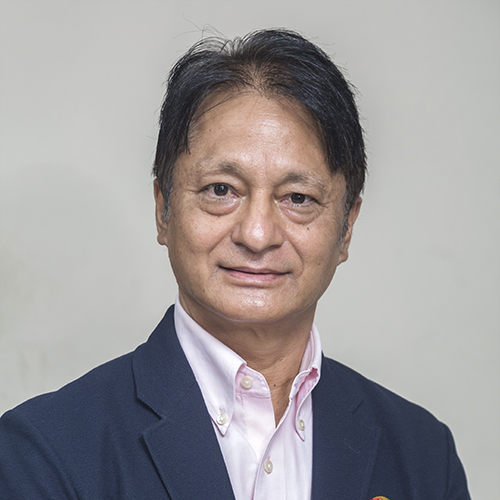
Chair,
FinTech Alliance Nepal
Sanjib Subba is a seasoned professional with extensive experience in the banking and financial industry. He currently serves as the Chief Executive Officer of Nepal Electronic Payment Systems Limited.
He began his career at Standard Chartered Bank, where he served as a Retail Banking Officer for eight years. During his tenure, he gained valuable expertise in retail banking operations and customer service. After leaving Standard Chartered Bank, Sanjib joined Webster University in Thailand as an Executive Director. In 2010, he joined the National Banking Institute as the Chief Executive Officer. Sanjib briefly served as a Senior Advisor at PwC before assuming the role of Chairman of the Board of Directors at NMB Microfinance Limited.
Outside of his professional roles, Sanjib is actively involved in promoting financial inclusion, entrepreneurship development, and digital finance systems. He has also contributed as a keynote speaker and panelist in various national and international seminars and events.
Sanjib holds an MBA degree and has completed executive education programs from prestigious institutions such as Stanford University and the World Bank Institute. He is also a certified Master Trainer by the International Financial Corporation (IFC) of the World Bank.

CEO and Director,
Lotus Holdings Pvt. Ltd.
Ajit Shah is an entrepreneur with knowledge and 20+ years of experience in diverse business sectors. He is the Director and CEO of Lotus Holdings – a family business that is active in real estate, hand made rugs, healthcare, and information technology employing over a thousand people. Ajit has has taken his company to the next level, focusing the investments and services on IT and outsourcing. His companies currently outsource across small to multi-billion dollar Fortune 50 companies around the world and are also involved in various technology projects with the Government of Nepal – a particular example is successfully helping the government collect over USD 170 million revenue annually, a 20 fold increase since pre-digitization. Ajit was also the pioneer in the digitization of Immigration and Border Control at the Ministry of Home in Nepal.
In his latest venture, Ajit has established an IT platform where he plans to scale Nepal up to become the back office of the world. He envisions that by 2030 Nepal will have an alternative source of foreign currency earnings at par to the current inflow of remittances while creating 1.5 million jobs.
Ajit sits on various national, bilateral business and social boards and committees to provide guidance and insight. He supports these institutions achieve more of what it is doing by leveraging his local and global reach to amplify and synergize objectives by replication, partnership and expansion
Among the Nepalese community Ajit Shah has become known for his entrepreneurial success, business ethics, corporate social responsibility, philanthropy and global outreach. He has addressed numerous national and international conferences and workshops to showcase and share his passion for making the world a better place.
Despite his financial prowess, Ajit is a devoted philanthropist and helps with the family foundation Hoste Hainse (www.hostehainse.org) – that provides free education opportunities to the underprivileged children of Nepal. Hoste Hainse through 5 different schools in Western, Central and Eastern Nepal has educated over 20,000 children since operation.
Ajit has a Bachelors Degree in Chemistry, Mathematics & Computer Science from the University of Minnesota, USA, and is currently undergoing Executive Education at the Harvard Business School.
Among others, Ajit is a member in the Board of Trade at the Ministry of Commerce in Nepal, which has the task of prioritizing sectors for economic development, and mitigating the trade deficit the country currently faces. Ajit is also the Chairman of the American Chamber of Commerce in Nepal. He sits on high-level committees of Federation of Nepalese Chambers of Commerce and Industry (FNCCI) where he is a member responsible for IT regulatory reforms. Ajit is a member of the CEO Forum at the Confederation of Nepalese Industries (CNI).
Having been raised in a Hindu and Buddhist culture, Ajit values integrity, compassion and embraces a people- first attitude in his business and philanthropic endeavors.
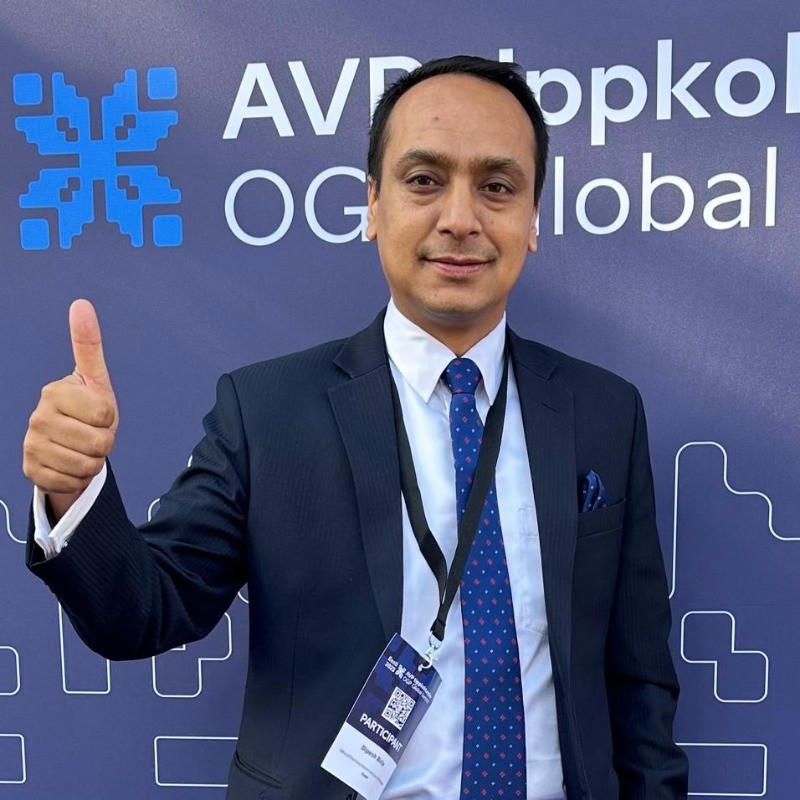
CEO / Member Secretary,
E-Governance Commission, Government of Nepal
Dipesh Bista is the Chief Executive Officer (Member-Secretary) of the E-Governance Commission under the Government of Nepal. With a background in computer engineering and law, he has also served as a Senior Lecturer for M.Sc. in Engineering Management at Purbanchal University and as an Assistant Professor for MBA IT at Tribhuwan University. Dipesh has been a board member of the Nepal Engineering Council and a member of the Subject Committee at Pokhara University. He holds a Master’s in Rural Development from Tribhuvan University, a BA L.L.B in Law, an M.Sc. in Engineering Management, and a Bachelor’s in Computer Engineering.
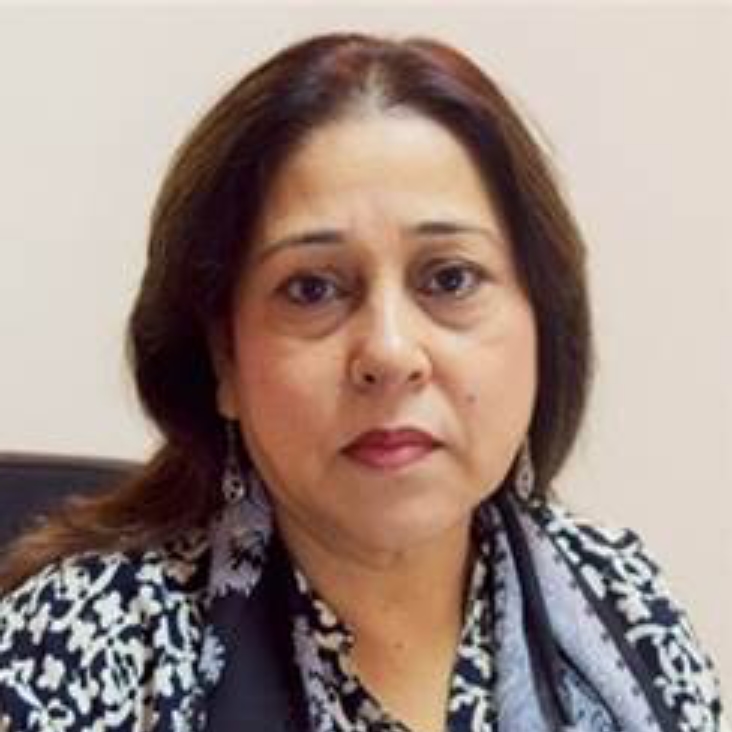
Chief-of-Party,
Hamro Samman Project, Winrock International
Ms Zainab Akther is the Chief of Party of Hamro Samman Project of Winrock International. She specializes in economic and social empowerment, gender equality and social equity, education and training, and livelihood development for women and men. She has more than three decades of experience. She has worked with USAID, the World Bank, ADB, CIDA, EC, DFID, AusAID, Sida, DANIDA, UNICEF, JICA, Planned Parenthood Federation of Canada and Plan International Canada. A Canadian citizen with Bangladeshi origin, she has worked in South and Southeast Asia, the Caribbean, and Canada.
CEO and Director,
Lotus Holdings Pvt. Ltd.
Ajit Shah is an entrepreneur with knowledge and 20+ years of experience in diverse business sectors. He is the Director and CEO of Lotus Holdings – a family business that is active in real estate, hand made rugs, healthcare, and information technology employing over a thousand people. Ajit has has taken his company to the next level, focusing the investments and services on IT and outsourcing. His companies currently outsource across small to multi-billion dollar Fortune 50 companies around the world and are also involved in various technology projects with the Government of Nepal – a particular example is successfully helping the government collect over USD 170 million revenue annually, a 20 fold increase since pre-digitization. Ajit was also the pioneer in the digitization of Immigration and Border Control at the Ministry of Home in Nepal.
In his latest venture, Ajit has established an IT platform where he plans to scale Nepal up to become the back office of the world. He envisions that by 2030 Nepal will have an alternative source of foreign currency earnings at par to the current inflow of remittances while creating 1.5 million jobs.
Ajit sits on various national, bilateral business and social boards and committees to provide guidance and insight. He supports these institutions achieve more of what it is doing by leveraging his local and global reach to amplify and synergize objectives by replication, partnership and expansion
Among the Nepalese community Ajit Shah has become known for his entrepreneurial success, business ethics, corporate social responsibility, philanthropy and global outreach. He has addressed numerous national and international conferences and workshops to showcase and share his passion for making the world a better place.
Despite his financial prowess, Ajit is a devoted philanthropist and helps with the family foundation Hoste Hainse (www.hostehainse.org) – that provides free education opportunities to the underprivileged children of Nepal. Hoste Hainse through 5 different schools in Western, Central and Eastern Nepal has educated over 20,000 children since operation.
Ajit has a Bachelors Degree in Chemistry, Mathematics & Computer Science from the University of Minnesota, USA, and is currently undergoing Executive Education at the Harvard Business School.
Among others, Ajit is a member in the Board of Trade at the Ministry of Commerce in Nepal, which has the task of prioritizing sectors for economic development, and mitigating the trade deficit the country currently faces. Ajit is also the Chairman of the American Chamber of Commerce in Nepal. He sits on high-level committees of Federation of Nepalese Chambers of Commerce and Industry (FNCCI) where he is a member responsible for IT regulatory reforms. Ajit is a member of the CEO Forum at the Confederation of Nepalese Industries (CNI).
Having been raised in a Hindu and Buddhist culture, Ajit values integrity, compassion and embraces a people- first attitude in his business and philanthropic endeavors.

Chief-of-Party,
Hamro Samman Project, Winrock International
Ms Zainab Akther is the Chief of Party of Hamro Samman Project of Winrock International. She specializes in economic and social empowerment, gender equality and social equity, education and training, and livelihood development for women and men. She has more than three decades of experience. She has worked with USAID, the World Bank, ADB, CIDA, EC, DFID, AusAID, Sida, DANIDA, UNICEF, JICA, Planned Parenthood Federation of Canada and Plan International Canada. A Canadian citizen with Bangladeshi origin, she has worked in South and Southeast Asia, the Caribbean, and Canada.
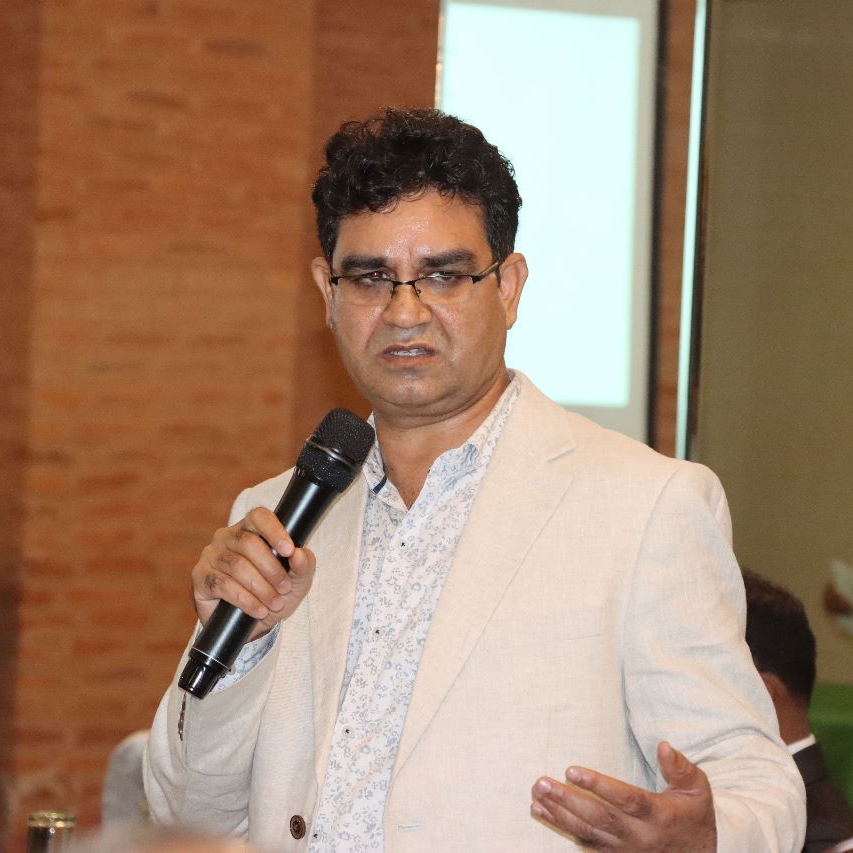
Portfolio Manager,
UNDP Nepal
Mr. Tek has been working with UNDP as a programme manager and looking after governance and rule of law. He is lawyer by training has experience of working as a human rights litigant. In addition, he has years of experiences as the advisor on human rights and has published numbers of articles and books on human rights.
Modern Slavery is defined as when an individual is exploited by others, for personal or commercial gain. It can take place in different form and the most common ones are human trafficking, forced labor, debt bondage/bonded labor, descent-based slavery, child slavery, forced and early marriage and domestic servitude. People may end up to become a victim of slavery because they are vulnerable to being trapped and exploited, often as a result of poverty and exclusion and because laws do not properly protect them. According to the latest Global Estimates of Modern Slavery 2022, 49.6 million people live in modern slavery – of the 27.6 million people trapped in forced labor, 17.3 million are in forced labor exploitation in the private economy. The emerging crisis- COVID-19 pandemic, armed conflicts, and climate change – in recent years have led to unprecedented disruption to employment and education, increase in extreme poverty and forced and unsafe migration, and an upsurge in reports of gender-based violence, together serving to heighten the risk of all forms of modern slavery.
Modern slavery is a serious issue in a number of geographies and industry sectors. No business can be sure its activities and supply chains are free of forced labor or trafficking. Hence, the businesses need to be proactive and inbuilt measures to prevent modern slavey from entering their supply chains. Companies giving priority to social and labor rights tend to be more successful and have greater levels of productivity and innovation, more predictable supply of goods and services, better retention and worker motivation, and more robust due diligence and monitoring systems. In addition, there are various industry coalition dedicated to promote responsible business conduct in global supply chain. These coalition benefits the companies to learn from leaders, access tools, improve efficiency and get out in front on emerging issues and risks in supply chain sustainability.
National Business Initiative (NBI) has formed a Responsible Business Alliance Nepal (RBAN), a structure network of progressive businesses, that come together to promote and build joint initiatives that advance social objectives as well as business development goals. The purpose of the Alliance is to improve knowledge and awareness about modern slavery and promote responsible business practices. The Alliance works on AAA Framework, a model to engage private sector towards ending modern slavery. It is a global framework developed by Business and Government Forum of the Bali Process to which Nepal is also a state party. NBI is expanding the RBAN network throughout the country. The alliance is one of the mechanisms to engage private sector towards ending modern slavery and its various forms in Nepal.
In today’s world where business and society are connected, no business can afford to ignore business ethics and corporate social responsibility. Concepts like CSR 4.0, Society 5.0, Creating Shared Value (CSV), Enlightened Shared Value (ESV), political CSR, and digital CSR are emerging. Additionally, in the wake of recent legal provisions vis-à-vis CSR, the institutionalization of mandatory CSR has become the need of the day in the Nepalese context. Likewise, adherence to ethical business practices has become more important than ever before for the sustainability of the business.
Against this backdrop, it is high time to embrace appropriate business ethics and CSR practices in order to make Nepalese businesses adaptive to changing realities and create a win-win-win situation between business, society, and the government.
As per ILO, Occupational Safety and Health (OSH) is defined as, ” Occupational safety and health is identified as the discipline dealing with the prevention of work-related injuries and diseases as well as the protection and promotion of the health of workers. It aims at the improvement of working conditions and environment.” Health and safety at work is guided by international standard ISO 45001. Occupational Safety aims to protect co-workers, family members, employers, customers, and many others who might be affected by the workplace environment.
OSH is important because safety risk is unavoidable at workplace, be it physical, mental or social risk to employees and customers. Fires, short circuiting, explosions, chemical hazards could present immediate threat to life. Poorly lit workplaces, work overload, loud noises etc. could also create several mental and emotional problems.
Occupational hazards and accidents are underreported in Nepal due to lower level of awareness of OSH and lack of sensitivity among management and employees in general. The promotion of OSH at workplace is regarded a modern corporate strategy and responsibility of the employers in the developed countries. But in Nepal, most of the entrepreneurs consider it as a cost burden. It is utmost important to make Nepalese businesses realize that OSH not only saves cost in the long run, but also creates additional opportunities, builds reputation and boosts productivity.
Businesses can profoundly impact the human rights of employees, consumers, and communities wherever they operate. They can be a powerful driver of sustainable development, offering access to social and economic opportunities and a pathway to prosperity. However, the actions of business enterprises can affect human rights, and those most affected are often among the most vulnerable. Yet alongside globalization, which has seen companies grow in size as well as the scale of their operations, scope for businesses to impact on human rights has increased. As a result, businesses must act with due diligence to address any negative impacts and avoid infringing on the rights of others. Various norms and mechanisms of human rights protection has been evolved and adapted to ensure the continuing effective enjoyment of human rights, and remediation and accountability for abuses, in the business context.
The ecological footprint is a measure of demands made by humans on global natural resources. It measures how fast we consume resources and generate waste compared to how fast nature can absorb our waste and generate resources.
Impact of businesses on environment and overall ecological balance has spun out global concerns like climate change, loss of biodiversity, resource scarcity, pollution and severe health impacts on people. So, it has become increasingly important for businesses to take steps to focus on sustainable development. Many businesses are now investing in processes and revamping their infrastructure to reduce their ecological footprint.
Understanding their own ecological footprint is the first major step for businesses. Moving towards a resource-efficient business model by reducing resource consumption, adopting sustainable practices, and implementing policies that promote environmental protection are vital to contribute to a sustainable future and assure resource availability for future generations. This session will focus on the practical strategies and solutions that responsible businesses can adopt to manage and reduce their impact on the environment.
Nepal is one of the most disaster-prone counties in the world because of its topography and varied climatic conditions. The country lies in an active seismic zone, and it has numerous young-fold mountains. That is the reason, it experiences frequent earthquakes. Floods, landslides, glacial lake outbursts, avalanches, wildfires, drought and other multiple hazards are also frequent in Nepal.
Economic Vulnerability Analysis shows that Nepal exhibits heavy economic losses – in terms of business operations, agricultural productions, tourism, infrastructure and property – as well as non-economic losses – in terms of impact on individuals, society and environment. This is because of high exposure to risk and the high level of hazards.
These disasters have a significant impact on business operations, supply chains, and financial stability.
Private sector businesses have always been actively engaged during emergencies in relief and response activities. But the preparedness of the business entities has been limited. Due to the lack of preparedness, many businesses succumb to the market collapse, and others suffer heavy setbacks. Investment in disaster preparedness and risk reduction has become more crucial than ever.
Businesses today are increasingly dependent on fossil fuels which is limited. Renewable energy sources that come from natural processes and are replenished over time, such as solar, hydropower, wind, geothermal, biomass is becoming more and more important. Powering business operations with renewable energy is not only environmentally friendly but also cost-effective.
Use of hydropower in industries is common practice in Nepal and now all shape and sizes of industries should start adopting renewable energy sources. This has far-reaching impact on the environment, economy and society. But for most of the Nepalese industries, switching to renewable energy comes with a hefty initial cost burden. Depending on the source, continuous availability can also be challenging. And existing legal provisions do not readily favor the switch to renewable energy. However, many governments, including ours have recognized the importance. In the long run, renewable energy will be more efficient and cost-effective. So, businesses need to work out on how to make this transition least costly and easier to adopt in the future.
The session on business enabling environment delves into the current state of the business enabling environment in Nepal, including the roles of government in creating and maintaining such an environment, the importance of infrastructure development, factors that contribute to a favorable investment climate, the significance of public-private partnerships, the role of regulations and compliance, and the importance of access to markets and trade facilitation measures.
This session will bring together industry experts, policymakers, and business leaders to analyze the challenges and opportunities faced by businesses in Nepal, in and around issues like infrastructure, access to finance, and bureaucratic barriers, with a focus on fostering a conducive environment for sustainable growth.
Innovation and entrepreneurship have been regarded as key drivers in technological progress and productivity development worldwide. As markets and technologies continue to evolve, businesses must adapt and innovate to remain competitive and relevant. As a result, organizations come across plethora of new opportunities as well as roadblocks. Workplace creativity and various forms of innovations are vital for any organization to gain competitive advantage and stay ahead of the curve.
So, businesses and enterprises need to identify market gaps, leverage emerging technologies, develop strategies and tools for innovative business models, and build effective teams. Entrepreneurship should not only drive economic growth but also provide new solutions to pressing societal challenges.
The corporate landscape is being significantly disrupted by the global digital revolution. By fostering increased connectivity, efficiency, and innovations, the digital economy is quickly changing the way we conduct business. Economic activities and transactions are globally enabled by information and communication technologies. This has led to several innovative solutions, newer business models and quicker and easier access to market and resources, all within the digital platforms.
Yet, as technology advances, it has brought along new set of problems. Foremost, there is the problem with accountability and safety which includes cybersecurity risks, privacy issues, data breaches and poor governance. There could be shortfall in human capabilities. Initial setup cost is also quite high and there could be ethical dilemmas due to digital divide, digital exclusion, and other forms of inequalities.
This begs the question of how businesses can fully leverage the power of digital technologies to grow while operating responsibly.
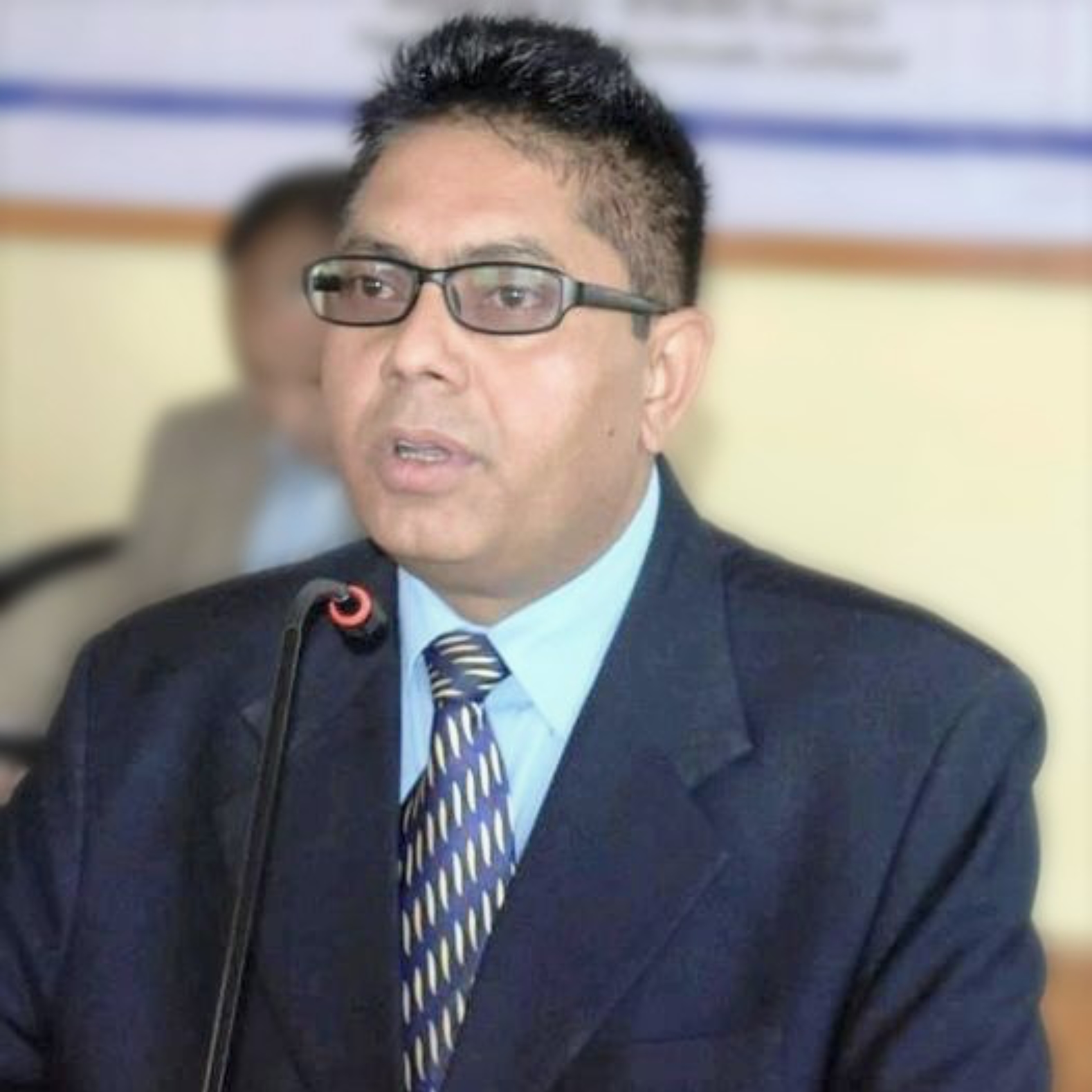
Acting Secretary,
National Human Rights Commission Nepal
Murari Prasad Kharel is with National Human Rights Commission for the last 22 years and is working as Acting Secretary of the Commission, Nepal since 30th May 2021
Mr. Kharel initiated his career in NHRC, Nepal as a protection officer in 2002 AD, and has gained abundant expertise in the protection and promotion of human rights while working in various positions in the commission. Mr. Kharel has a decade-long managerial and field-level human rights experience and had also led the NHRC office at Nepalgunj, then mid-west region, the most affected area during the armed conflict.
Mr. Kharel holds a Master’s Degree in Geology (M.Sc.) in 1997 A. D, started his career as a lecturer in the Department of Geology (TU) and continued it for four years. Mr.Kharelcompleted a Master’s Degree in Social Science in 2003 A. D from the Department of Sociology and Anthropology (TU Nepal). In addition, he has also obtained a number ofinternational courses including the Chevening Scholarship on peace and conflict resolution course in the UK and IHRTP in Canada, etc.
Mr. Kharel has facilitated more than 100 training and workshops organized by NHRC and as a resource person organized by various organizations. He has played a crucial role in designing training curricula and IEC materials for training workshops for HR defenders, journalists, teachers, security personnel, government representatives, political party cadres,etc. Mr. Kharel has presented various papers on human rights issues including transitional justice, mediations, human rights education, federalism and security of HRDs, UN human rights mechanism, and reporting of UPR.
Mr. Kharel has also been involved in various NHRC policy formulations and preparation of guidelines including human rights investigation procedures, collaboration/coordinationguidelines with civil society and other constitutional commissions, HR monitoring during the Covid 19, communication strategy, MOU with Malaysia regarding the rights of Migrant worker etc. Moreover, Mr.Kaharel has played a vital role on behalf of NHRC, Nepal while drafting the Comprehensive Peace Accord in 2006 AD. Furthermore, he has been continuously involved in advocacy, media campaign, and monitoring and investigation of human rights violation issues.
In the course of participation in training and for paper presentations on behalf of NHRC, he has visited many countries – the United Kingdom, Republic of Ireland, Canada, Switzerland, France, India, Austria, Germany, Hungary, Philippines, South Korea, Malaysia, Thailand,Bangladesh, Denmark, and Sweden, etc.
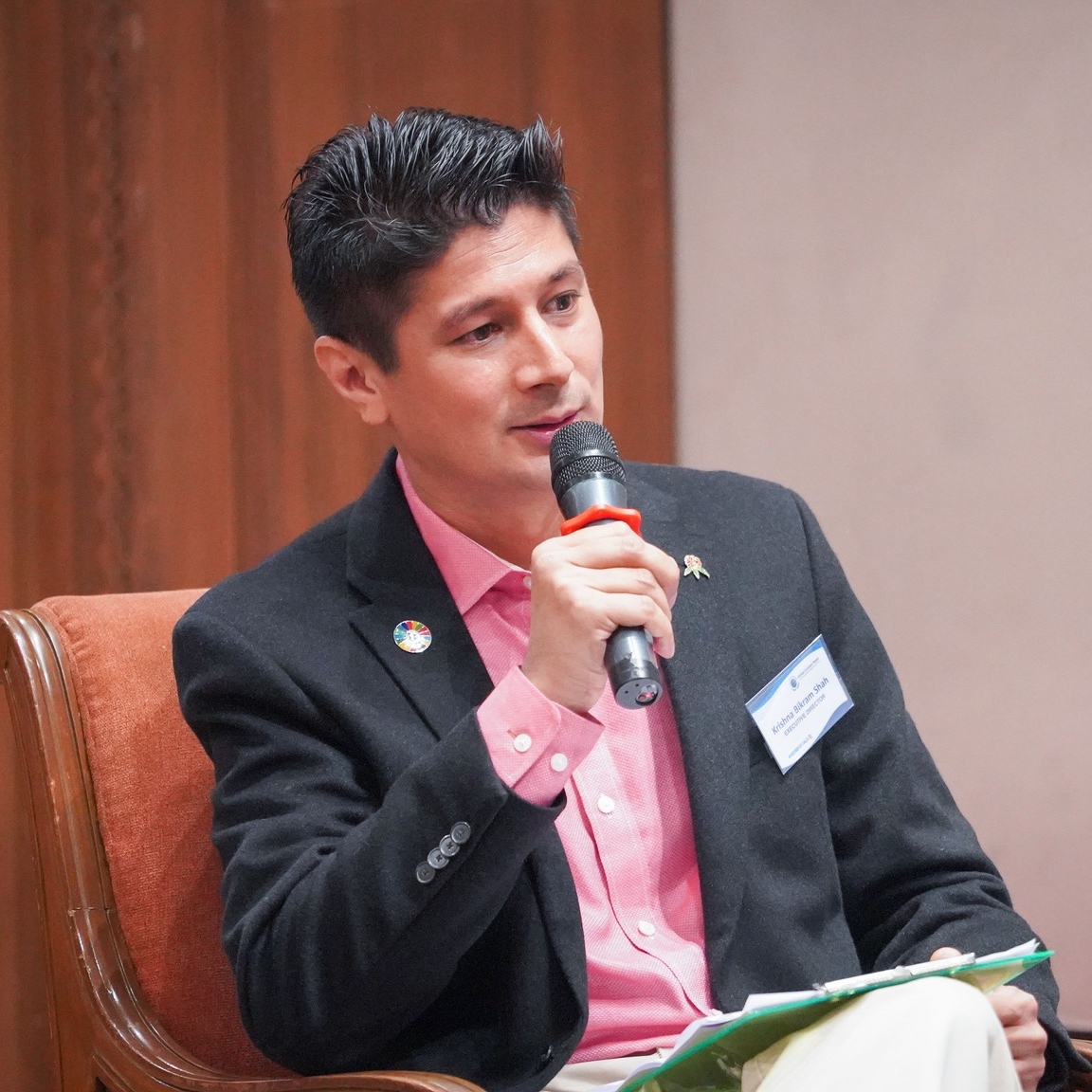
Director,
Lotus Holdings Pvt. Ltd.
Krishna Bikram Shah is the Executive Director Pro Bono at Global Compact Nepal, the local network of the United Nations Global Compact (UNGC), a voluntary non- binding United Nations pact to encourage businesses worldwide to adopt sustainable and socially responsible policies, and to report on their implementation. Before joining the Global Compact in 2019, Krishna was the Executive Director Pro Bono at Hoste Hainse, a non- profit non-governmental organization (NGO) that caters to sustainable community development through education. Krishna also serves on the board of GoodWeave, an organization that is dedicated to ending illegal child labour primarily in the hand-knotted rug manufacturing industry. In addition to being a Rotarian, Krishna is also the Vice-Chair on the board of the US Embassy School in Kathmandu. Although his formal education is technical with a Master’s in Software Engineering, he has sustainability in his DNA with 25+ years of hands-on experience and activism.

Chairperson,
Syakar Trading Company Pvt. Ltd.
Director,
Jyoti Group of Companies
Saurabh Jyoti is the chairman of Syakar trading company pvt. Ltd and a director of a jyoti group of companies. He is graduated from the B.M.S collage of Engineering, Banglore India.
He is the Past president of Nepal Automobile Dealers Association (NADA) and NYEF .Past chairperson OF SAARC. He served 15years in various positions in FNCCI.
He has been awarded by Youth Ambassador for Peace Award, Competent Communicator –Everest Toastmaster.
He loves Automobiles, Motorsports, travelling.
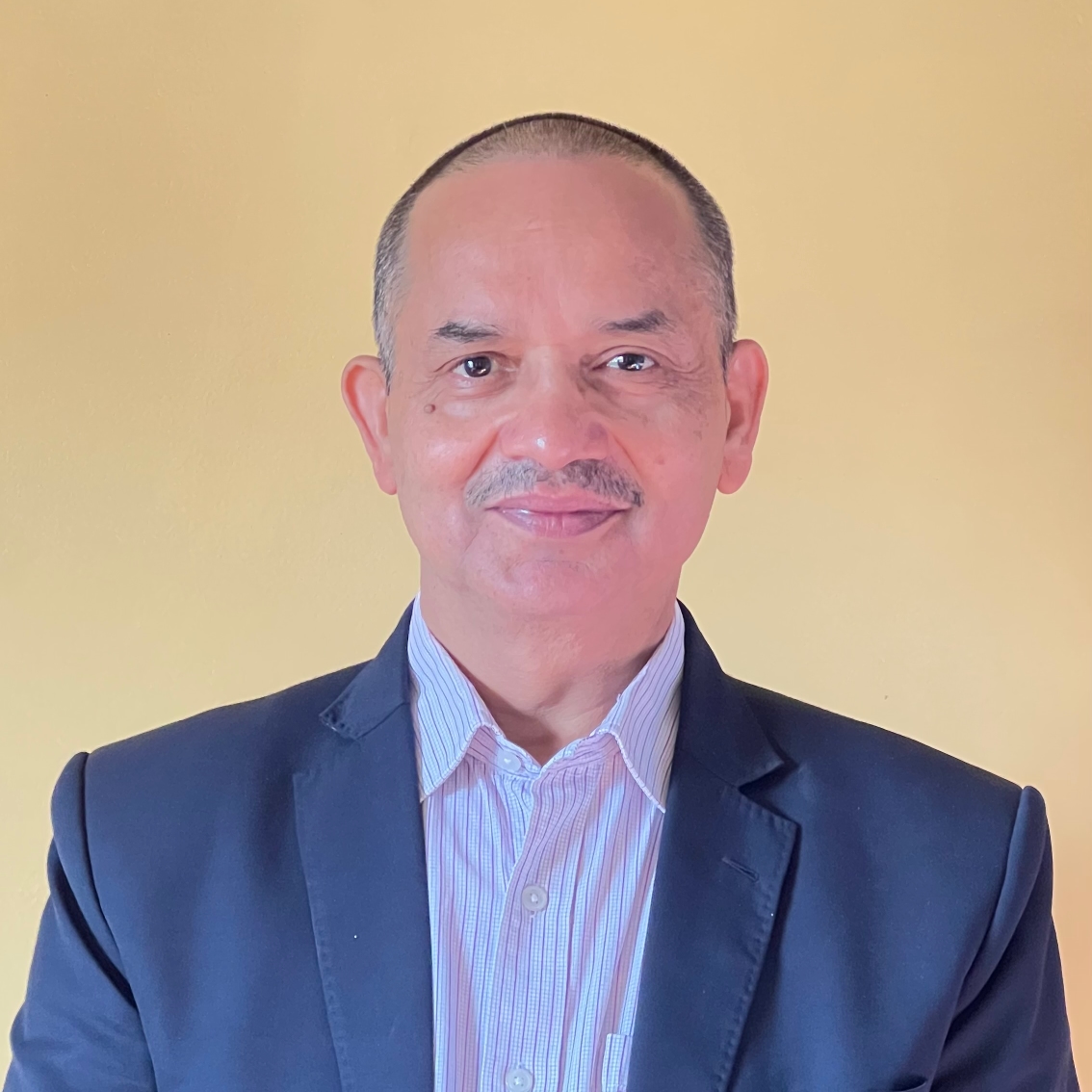
Former Vice-Chairman, National Planning Commission
Professor, Institute of Engineering, Tribhuvan University
Prof. Dr. Govinda Raj Pokharel has over 25 years of professional experience in public policy, planning, budgeting, international development and academia, most recently as CEO of Reconstruction Authority (Ranked at Par with Cabinet Minister) and as Vice Chairman of the National Planning Commission, Professor of Energy, Economics, Industrial and Mechanical Engineering, and executive director of a large public institution for the promotion of renewable energy – Alternative Energy Promotion Centre (AEPC).
Currently serving as a Professor at the Institute of Engineering, Tribhuwan University, Nepal, he holds a Ph.D. in Economics with a focus on Energy from Germany. He has an MSc in Appropriate Rural Energy Technology, Policy, and Extension Skills from Germany, as well as a BE in Mechanical Engineering from Rajasthan, India.
A seasoned academic, Dr. Pokharel has demonstrated his commitment to research by serving as the Coordinating Lead Author for Chapter 11 of the Special Report on Renewable Energy Policy of the IPCC. His expertise is reflected in numerous research papers on topics ranging from sustainable energy and climate change to disaster and financing. His comprehensive knowledge of national-level policy, planning, budgeting, and development activities underscores his impact on Nepal’s socio-economic landscape.
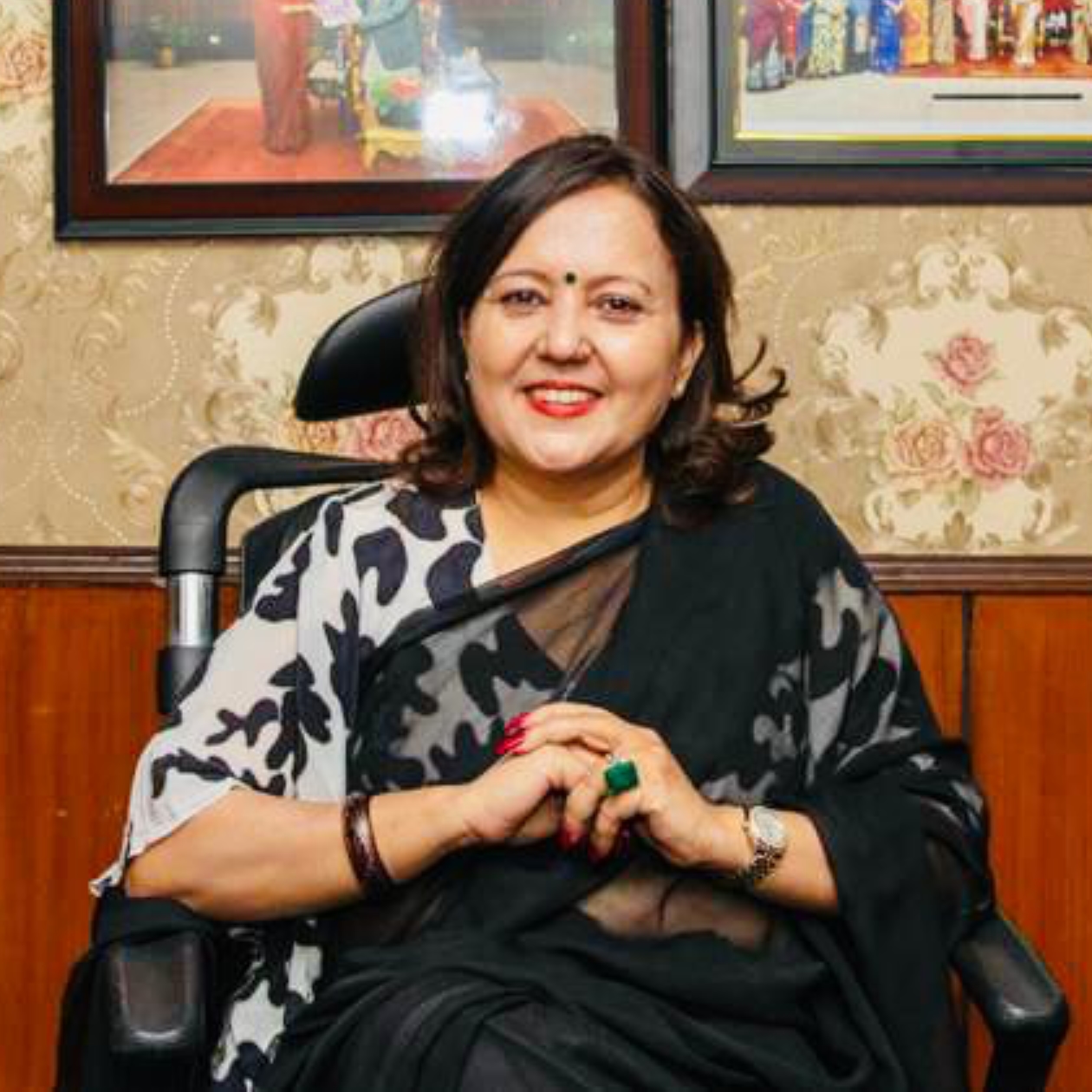
President,
Federation of Woman Entrepreneurs’ Associations of Nepal
Shova Gyawali is a prominent figure in the field of entrepreneurship and media in Nepal. She currently serves as the President of the Federation of Women Entrepreneurs Association of Nepal (FWEAN), where she plays a crucial role in empowering and supporting women entrepreneurs in the country. Additionally, she holds the position of Immediate Past President at the Nepal Philippines Chamber of Commerce and Industry.
Gyawali is also known for her work as a founder and active director of Nepal Republic Media, a leading media organization in the country. Under her leadership, the media group operates two radio stations and publishes two highly acclaimed daily newspapers, Republica and Naagarik, as well as various weekly, monthly, and yearly publications.
Beyond her entrepreneurial and media endeavors, Shova Gyawali is a passionate advocate for social issues. Furthermore, she is a published author, having written two books titled “Sampurna Aakash” and “Sangharsh”.
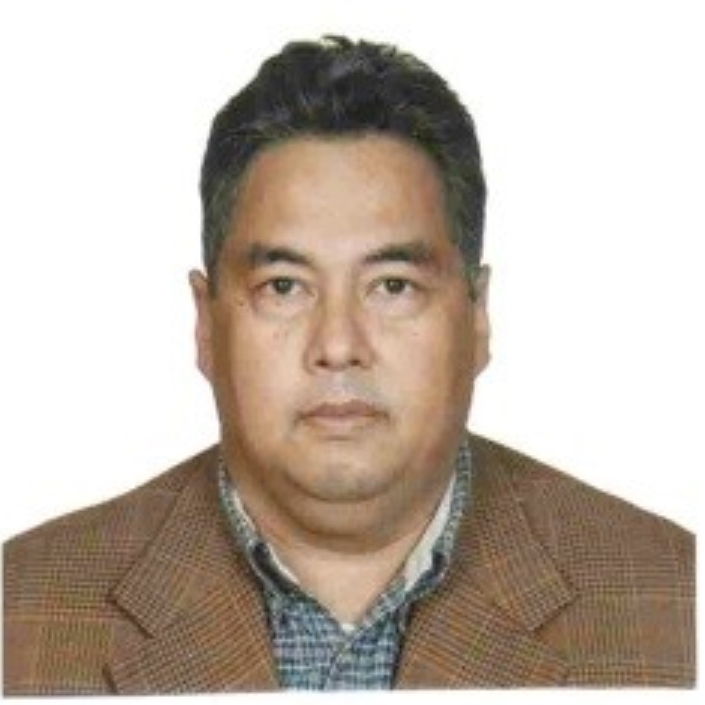
Board Member,
Nepal Bank Limited
Mr. Rana is an IT professional specializing in ICT governance, digital Strategy, Risk Management, Cyber security, Benefit realization, ICT assurance and Audit practices.
Vivek is an Electrical Engineer from University of Arizona, an MBA from KUSOM, Masters in Electronic Governance Public policy from EPFL Lausanne, Switzerland and Masters in ERP from University of Scranton US and Executive education in FinTech and Digital Banking.
Vivek has worked extensively in the US, Africa, South and SE Asia, Australia and Pacific, and the Middle East region in areas of ICT security and Business – IT alignment projects.
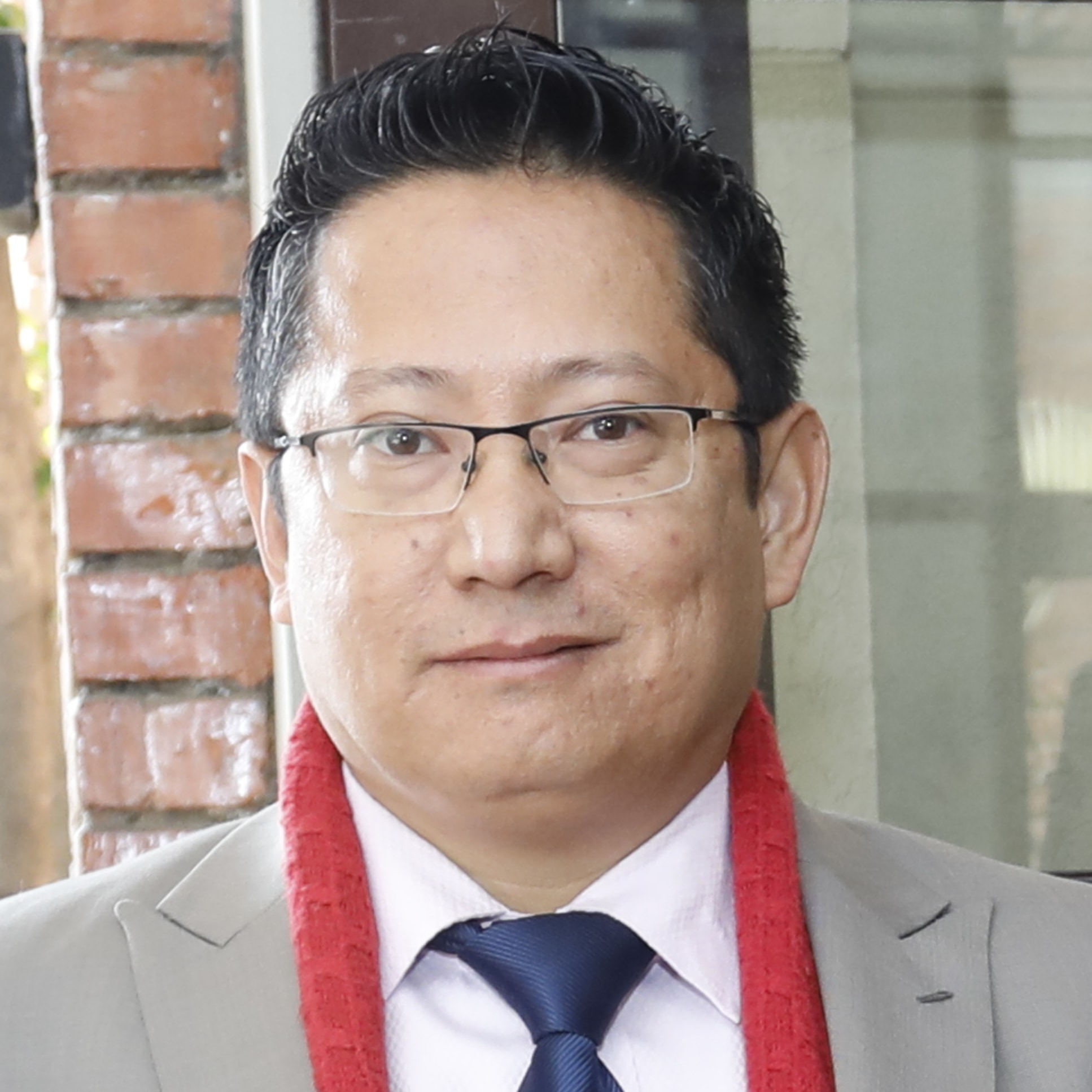
Founder & Chief Executive Officer,
Wind Power Nepal Pvt. Ltd.
Kushal Gurung is a clean tech professional, with more than 15 years of work experience spanning across Asia and Europe. He is the Founder CEO of WindPower Nepal, a renewable energy and engineering company. He is also a co-founder and Director of Gandaki Urja, a company that converts organic waste to produce bottled biomethane gas (bioCNG) and organic fertilizer. And recently, he has started an agri-tech venture, Muttha Agro- a commercial greenhouse hydroponics vertical farm.
Kushal is a board member of Alternative Energy Promotion Center (AEPC). He was also an Expert Member of the Government of Nepal’s Environment Protection Council, chaired by the Prime Minister of Nepal. He was selected as Asia 21 Young Leaders for 2017 by the Asia Society, USA. He has been recognized by the University of Edinburgh Business School as one of the best 100 Alumini in the last 100 years. Kushal holds MSc in Carbon Management from the University of Edinburgh, UK and MSc in Environmental Science from the Tribhuvan University.
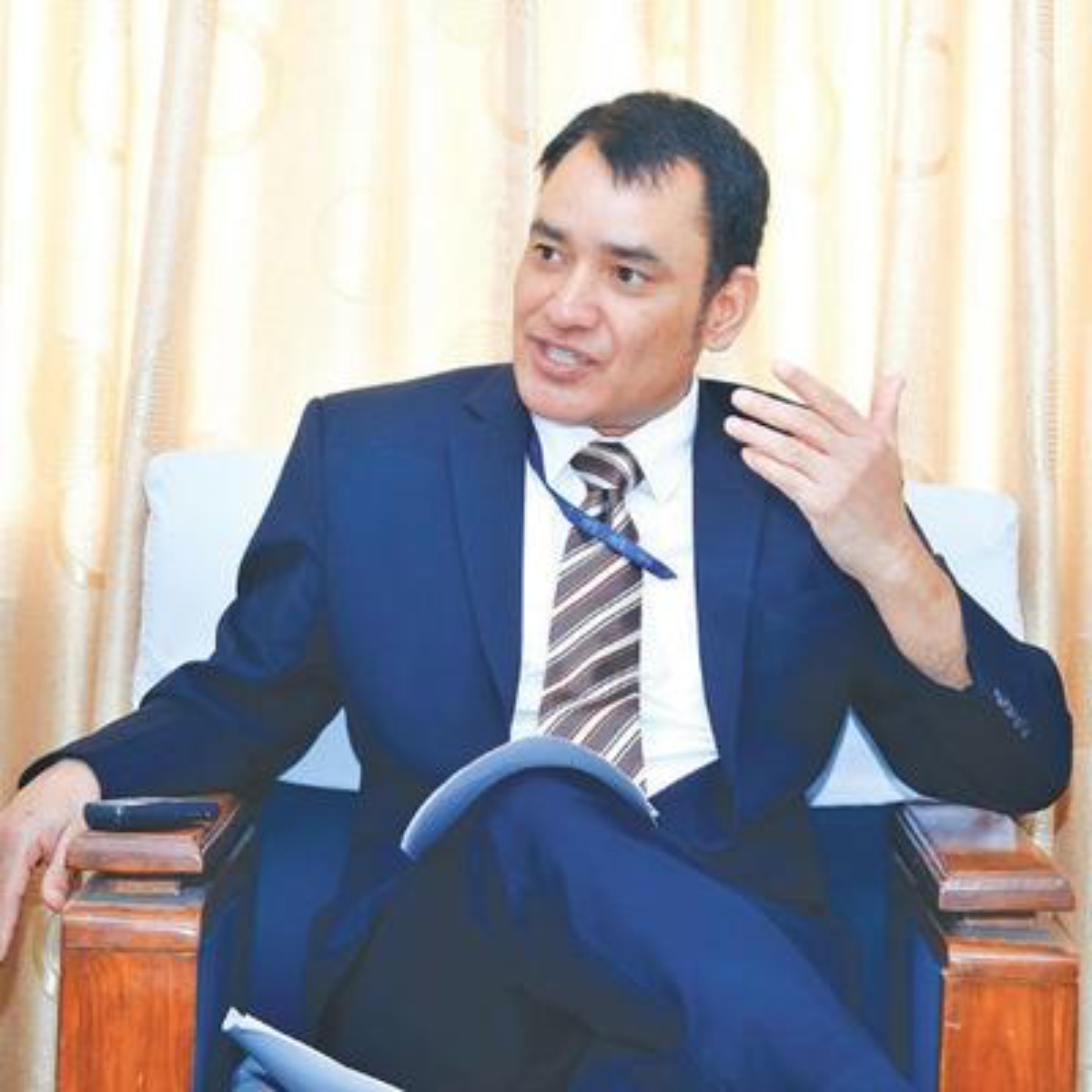
Former Executive Director,
Nepal Rastra Bank
As a former Executive Director of Nepal Rastra Bank, Nara Bahadur Thapa is a well-known figure in the banking sector of Nepal.
In more than three decades of public service, he has held diverse roles. As the Head of Research Department at NRB, he directed the drafting of annual, half-yearly and quarterly monetary policy and guided the preparation of key macro-economic reports of Nepal. He supervised the banking operations and currency management in the Eastern Region of Nepal as Chief Manager at NRB Biratnagar Office. He also represented Nepal as an Advisor at the International Monetary Fund in Washington DC and attended several meetings in international platforms, including those at World Bank, BIS, JICA, SEACEN Centre, SAARC Finance, Deutsche Bundesbank, Indian Chambers of Commerce and Industry, RBI, to name a few .
He holds his Bachelor’s and Master’s Degrees in Economics from the University of Bombay, India, and M.Phil. from the University of Glasgow, UK.
He has participated as a speaker in a number of audio-visual media, trainings, and workshops.
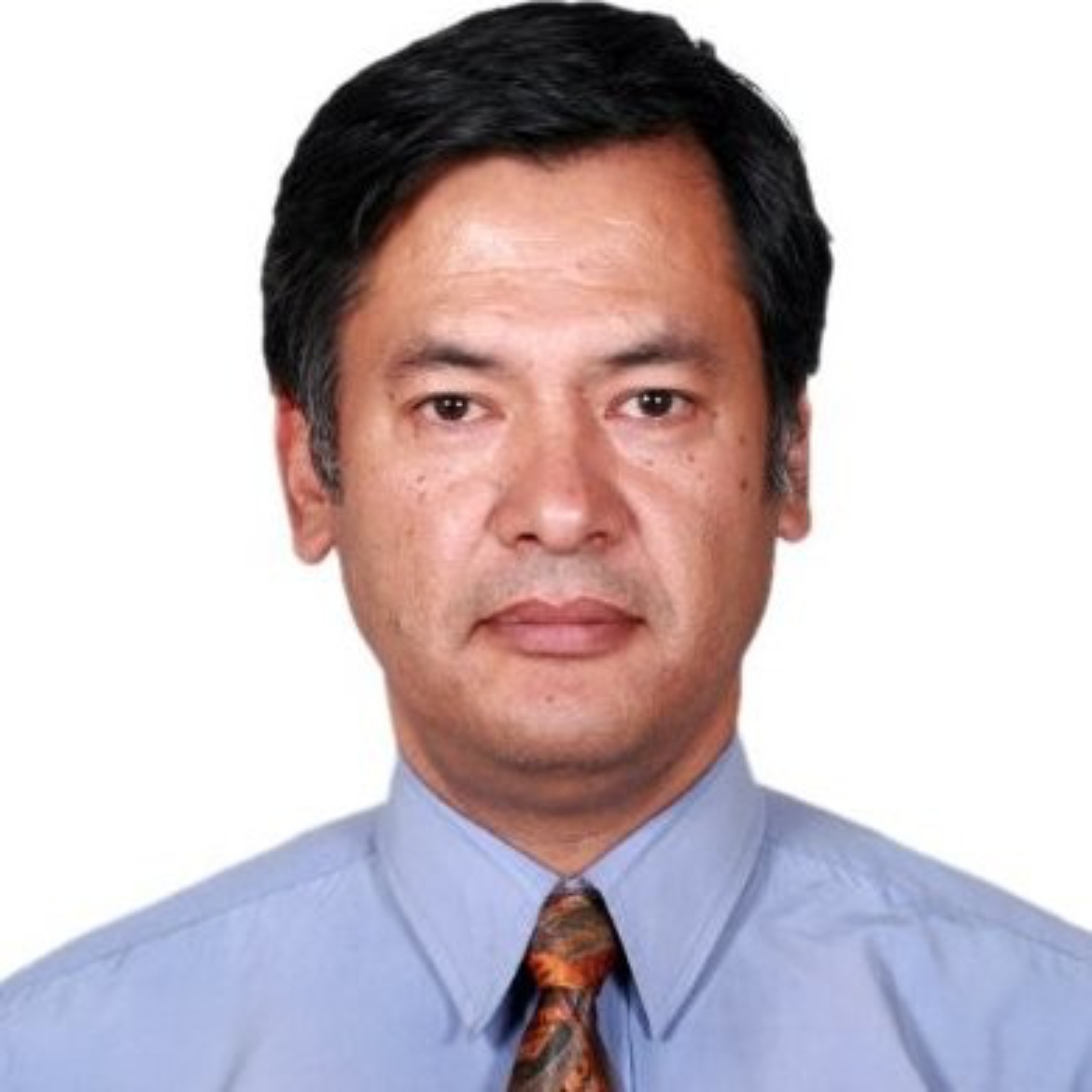
Former Managing Director,
Nepal Electricity Authority.
Freelance Expert (Energy Sector)
Hitendra Dev Shakya is an experienced professional with over 33 years of work experience in Nepal Electricity Authority (NEA) and its subsidiary companies, as well as in other government entities. He has held various positions throughout his career, including Managing Director of NEA from November 2020 to August 2021.
During his tenure as Managing Director, NEA achieved several significant milestones, such as completing and operating Nepal’s first ever 400kV substation in Dhalkebar, the first ever transmission line operated at 220kV from Dana to Kusma, and the largest power plant in Nepal to date, the Upper Tamakoshi hydropower plant with a capacity of 456 MW.
Although deputed to Water and Energy Commission as the Expert Member, Secretary class, he is now presently working as freelance Expert.
In addition, he has extensive experience in designing electrical systems for power plants, including the Chilime, Upper Sanjen, and Middle Bhotekoshi power projects. He has also been actively involved in promoting innovative and indigenous technologies in Nepal, such as electric vehicle policies, mini-grid interconnection, and indigenous floating solar plant designs.
Passionately active in promoting innovative and indigenous technologies for Nepal, he served to prepare Electric Vehicle national policy in 2013, and Mini-grid interconnection and EV charging multiplex studies and indigenous floating solar plant designs. He is doing research in Electricity market design and more recently, in Transformer design and Electric Trucks with National Invention Center.
He holds a Master’s degree in Electrical Power Engineering from KU, Nepal, a Post Graduate Diploma from N.T.N.U, Norway, and a Bachelor’s degree in Electrical Engineering from REC Durgapur, India. He continues to be involved in research and development, focusing on electricity market design, transformer design, and electric trucks.

Chairperson,
Women Friendly Disaster Management – Gender and Inclusion Core Group
With more than 58 years of working experience, Ms. Chandni Joshi’s name is synonymous with gender, rights and macro policies in Nepal and other South Asian countries alike. Envisioning all her life of a gender just world, she had consistently strived for a world of equal opportunities, equal choices and equal recognition of work of both women and men. From a Lecturer at Padma Kanya College to the Regional Director of UNIFEM (United Nations Development Fund for Women) for South Asia, Ms. Joshi’s professional journey has given her innumerous challenges at national, regional and global level which have enhanced her capabilities and evolved her into a powerhouse of knowledge in diverse issues. She is an inspiration to her peers and younger generation and an asset to her nation, Nepal.
Ms. Joshi’s twenty-six years of national civil service, eighteen years of international civil service and recent fourteen years of freelancing has enabled her to possess a remarkable blend of multi-faceted and multi-dimensional development experience, spanning at all levels – micro, meso and macro. She was formerly Joint Secretary as well as Chief of Women Development Division, Ministry of Local Development in the Government of Nepal. She is the Founder who had initiated a pioneering programme PCRW – Production Credit for Rural Women, which is recognized as a model program for women’s economic empowerment.
Ms. Joshi has represented the Government of Nepal at national, regional and international meetings, seminars and workshops. These include, the UN General Assembly, New York (1989), the Third World Conference on Women in Nairobi (1985), the NAAM Conference (1985), ESCAP (1997) and several SAARC Technical Committees and Thematic Regional Meetings.
Ms. Joshi’s work has always been rights-based and her areas of specialization include advocacy on gender issues at local, national, regional and international levels. She has been able to successfully lobby with diverse groups, which include national governments, regional institutions, UN agencies, NGOs, donor communities and the private sector. For example, she successfully lobbied with 15 governments of the South Asia region for the ILO Convention 177 on Home-based Workers, at the Asia Pacific ministerial level meeting in Bangkok in 1996. In 2001 and again in 2007, on behalf of UNIFEM, she initiated and signed a Memorandum of Understanding with the SAARC Secretary General for the empowerment of women in South Asia with the concurrence of Member Countries. This has served to give an edge to regional cooperation to advance the situation of women in South Asia and initiate the SAARC Gender Base initiative on violence against women.

Senior Factory Inspector,
Ministry of Labour, Employment and Social Security, Government of Nepal
Sujan Jojiju, a mechanical engineer with expertise in sustainable development and industrial ecology, is currently working as a Senior Factory Inspector for the Ministry of Labour and Employment. His areas of expertise inlcudes drafting and finalizing labour related laws, regulation, National Child Labor Master Plan, ILO reporting of the ratified and unratified conventions, occupational safety and health. He has also worked as a mechanical engineer for the Nepal Bureau of Standards and Metrology, focusing on product certification and conformity assessment. Sujan has a Bachelor’s degree in Mechanical Engineering from Tribhuvan University and a Master’s degree in Industrial Ecology from Chalmers University of Technology/University of Graz.
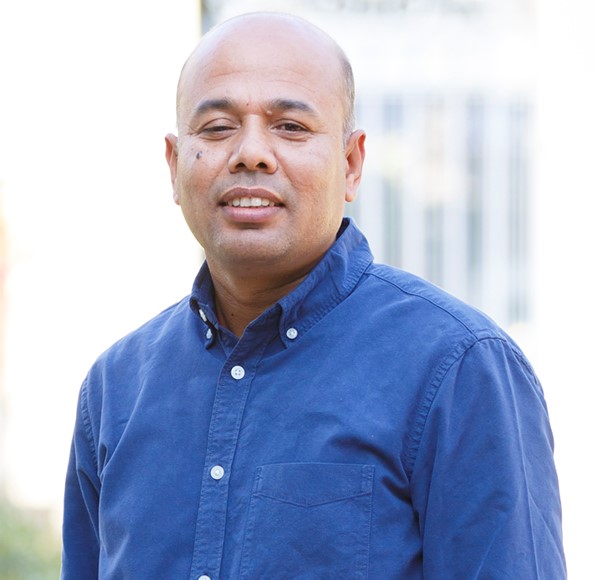
Head of Investigations,
Equidem Charity
Rameshwar is the head of investigations at Equidem, a human rights and labour rights charity (headquartered in London). He manages Equidem’s investigation function in across the South and South-East Asia, Arab Gulf and Middle East, and Africa. He has worked in the field of human rights for over two and half decades, including as Amnesty International’s longest serving Director in Nepal before joining Equidem in late 2016.
Rameshwar led or been part of over 30 research projects on labour rights and rights of migrant workers in Nepal and abroad.
Rameshwar has a range of expertise including on research and investigations of serious human rights abuses, review of policies and procedures, and yielding practical solutions, strategic thinking, project planning, effective implementation, monitoring and evaluation, advocacy and campaigning, networking and partnership, movement building and working with diverse groups or rights holders and capacity building on human rights and labour rights.
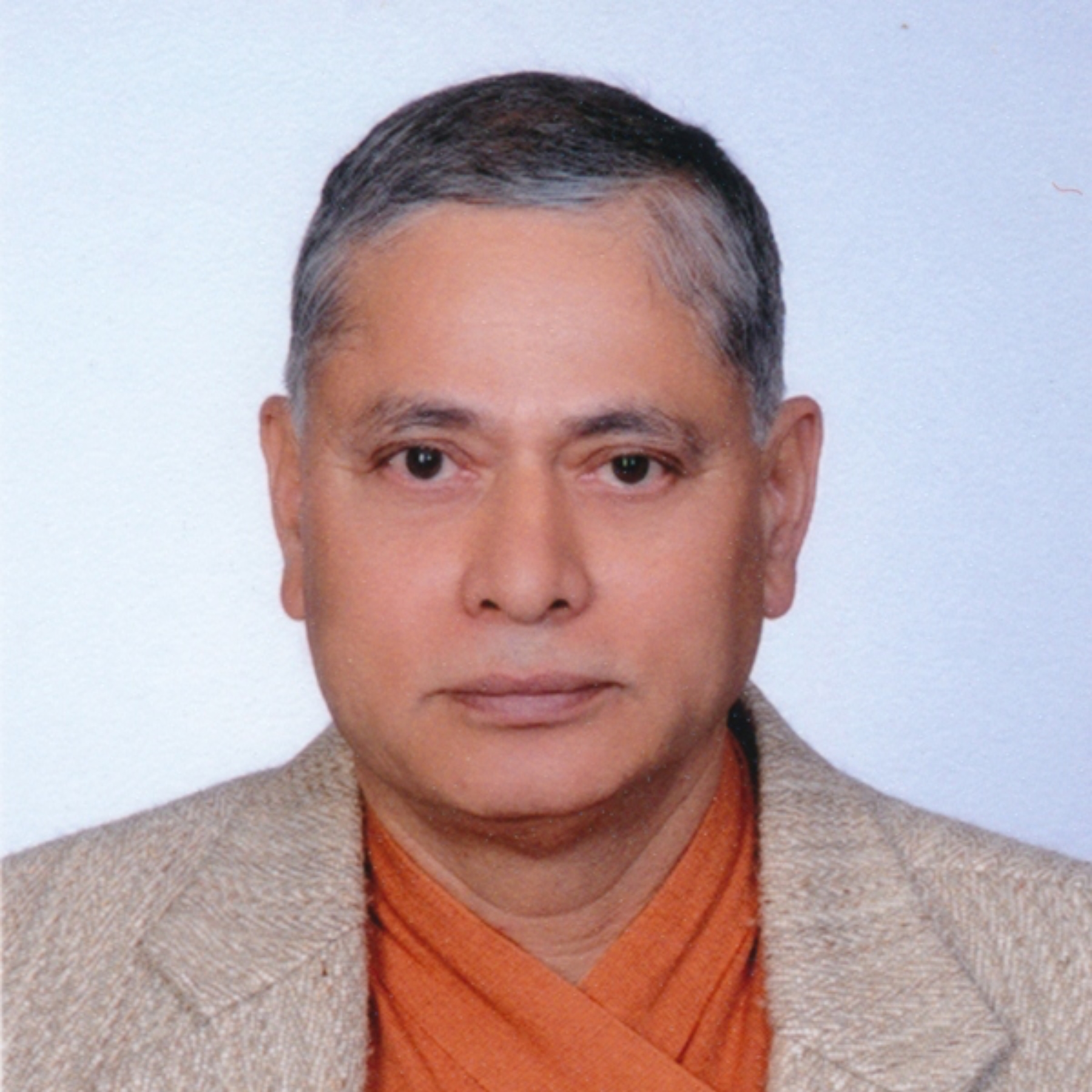
Founder,
MM Group of Industries.
Subodh Raj Pyakurel has been a human and civil Rights champion for over four decades. He has demonstrated dedicated leadership in democratic movements in Nepal and several countries and South Asia. He is an opinion builder and influencer on Nepal’s critical governance issues. He staunchly believes in a peaceful transition towards achieving social justice through affirmative policies. He holds a Master’s degree in Business Management from Tribhuvan University and a Financial Analysis Diploma from Bradford University, UK, (1984).
He heralded the leadership of INSEC (Informal Sector Service Center), the largest human rights organization of Nepal for sixteen years (2003 to 2018), and served two leadership terms at FORUM-ASIA (2007 to 2012), the largest human rights organization in Asia. He has been a part of extensive meetings and dialogue on human rights around the world -from South/East Asian to European countries. American President Barack Obama invited him for his role as prominent human rights and democratic rights leader, (2010). He has also served as the founder vice chair of the Provincial Planning Commission of Koshi province (2018). He was actively engaged as coordinator of the mission for establishing South Asian Human Rights Mechanism. He has been a part of several international meetings and missions at the United Nations Human Rights Council (UNHRC) and the UN headquarters.
He had previously served as the Coordinator of the Eastern Regional joint democratic movement Committee of Nepali Congress and Left Front during the People’s Movement of 1991. Furthermore, he was heavily engaged in garnering support from the international community and drawing attention of the UN and other international partners during the People’s Movement, 2005. He was arrested and imprisoned several times during the panchayat regime.
Beyond public service, he is the Founder of MM Group of Industries, (1986) and has been a gold medalist bank manager for excellence in priority sector lending at Nepal Bank Ltd, (1983). He is founder president of Rajbiraj Jaycees, (1976) and Executive VP of Nepal Jaycees, (1978).
He is a resident of Biratnagar, Nepal and is married to Lata Pyakurel. He has two sons, two daughter in laws and four grandchildren.

Founder and CEO,
Sastodeal.com
Amun Thapa is the Founder and CEO of Sastodeal, Nepal’s leading e-commerce platform, which has garnered support from notable investors like Dolma Impact Fund, ICTC Group, Ramesh Corp, NIBL Ace Capital, and IME Group. Alongside his role in e-commerce, Amun is the co-founder of Khaalisisi.com, a prominent waste management company in Nepal, showcasing his commitment to both business innovation and sustainable practices. His dynamic leadership has propelled Sastodeal to the forefront of the local e-commerce scene, while Khaalisisi stands as a testament to his dedication to environmental responsibility.

Co-founder / Director
Origami Creative
A first-generation entrepreneur, keen listener, and man of details, his passion is building business brands with a Purpose. He comes with more than two decades of experience in the areas of branding, advertising, marketing, and communications.
Laeeq co-founded Origami Creative, a boutique creative firm, in 2000, and Bloombox Brand Engineers, a brand consulting entity with a presence in Bangalore, Dubai, and Canada. The group has grown to be a family of around 100 now, with multiple interests in the areas of business brand consulting, marketing, and advertising. His core responsibilities currently include the development of new markets. New business development and strategic collaboration in India and Middle East markets. He has played and active role in many brand story rollouts in India and the Middle East markets.
Laeeq is also President of The Ad Club Bangalore, India Ambassador- World Creativity & Innovation Council, Convenor – Startup Initiatives at CII Karnataka as well as Co-Convenor of CII Southern Region startup panel. He served as the Chairperson of CIII Indians Bangalore.

Director
Global Business Initiative on Human Rights
Sophia Areias is a programmatic Director with GBI and leads our external engagement with business practitioners and other stakeholders around the world to strengthen business practice by convening regional workshops and disseminating practical insights and lessons learned on managing human rights issues effectively. Prior to joining GBI, Sophia spent several years in Southeast Asia, leading Transparency International Cambodia’s business integrity work and working on private sector engagement with UNDP’s Business and Human Rights and Fair Business teams based in Bangkok. She also taught business law and legal writing at the National University of Management and the Royal University of Law and Economics in Cambodia. Additionally, Sophia has worked on projects related to human rights investigations and accountability, pre-trial detention, and gender-based violence in several countries in Africa. Sophia has a B.A. in International Affairs from The George Washington University, and a J.D from Santa Clara University School of Law. She is a U.S. qualified lawyer.

Director, Environmental and Strategic Initiatives
Bayat Foundation
Established in 2005, the Foundation is the largest private philanthropic organization in Afghanistan, completing more than 1,000 projects dedicated to improving the quality of life for the youth, women, poor, and elderly of Afghanistan. Focused on maternal and early childhood health; education; modern slavery; and humanitarian response, our projects have included the construction of new facilities and sustainable infrastructure in needy regions; the promotion of health, education, economic, and cultural programs; and – perhaps most significantly – the construction of 13 maternity hospitals that have now treated nearly 4 million mothers and babies. The Foundation is pleased to have been the Afghan business representative to the Bali Process Government and Business Forum since 2017. Mr. Simus has advised the Foundation’s Board since 2005, and focused much of the past two decades on the deployment of catalytic philanthropy, innovative social finance, and equity investment capital to high-growth, purpose-driven enterprises that serve millions of at-risk Afghans. A graduate of Yale and Harvard, he served as a Senior Advanced Leadership Initiative Fellow at Harvard from 2015 – 2017 focusing on research related to the water-energy-food nexus, and is currently appointed as an Impact Leader in Residence at Harvard, focusing on climate change and adaptation-related investing.

President
Nepalese Young Entrepreneurs’ Forum (NYEF)
She has been managing the 23-year- old family business of manufacturing bamboo and wood composite furniture and flooring for the past seven years. She has been a vocal advocate of sustainable living and the green revolution. She is also the Co-Founder and Director of Tavisi an e-commerce platform for women. She graduated from Bond University in Australia majoring in Entrepreneurship and holds a master’s degree in Crisis Management from Tribhuvan University, Nepal. She is currently the President of the Nepalese Young Entrepreneurs’ Forum (NYEF), a volunteer membership- based organization working to empower young and aspiring entrepreneurs of Nepal as well as a network of more than 700 young entrepreneurs across the country.
She is also the Co-Chair of the Scholarship Committee and a member of the Leadership
Committee at Zonta Club of Kathmandu, Zonta International that works in empowering women.

Chair and Senior Advisor
Global Business Initiative on Human Rights
Andrea Shemberg is Chair and Senior Advisor to the Global Business Initiative on Human Rights. She is a common law and international human rights lawyer with more than 20 years of experience in business and human rights. From 2007 to 2011, Andrea served as Legal Advisor to the UN Secretary-General’s Special Representative on Business and Human Rights, John Ruggie (SRSG). She led the SRSG’s work on investment, leading the SRSG’s process to realise the Principles for Responsible Contracts, presented to the UN Human Rights Council with his final report. She began her legal career as a management-side employment and labour law lawyer with a commercial law firm in the United States before completing her MSc in Human Rights at the London School of Economics and Political Science. Andrea also served as Legal Advisor to the Economic Relations team at Amnesty International UK and established the first Economic Relations team at the International Commission of Jurists in Geneva. Andrea teaches business and human rights and consults privately for civil society organisations, multilateral institutions and companies.
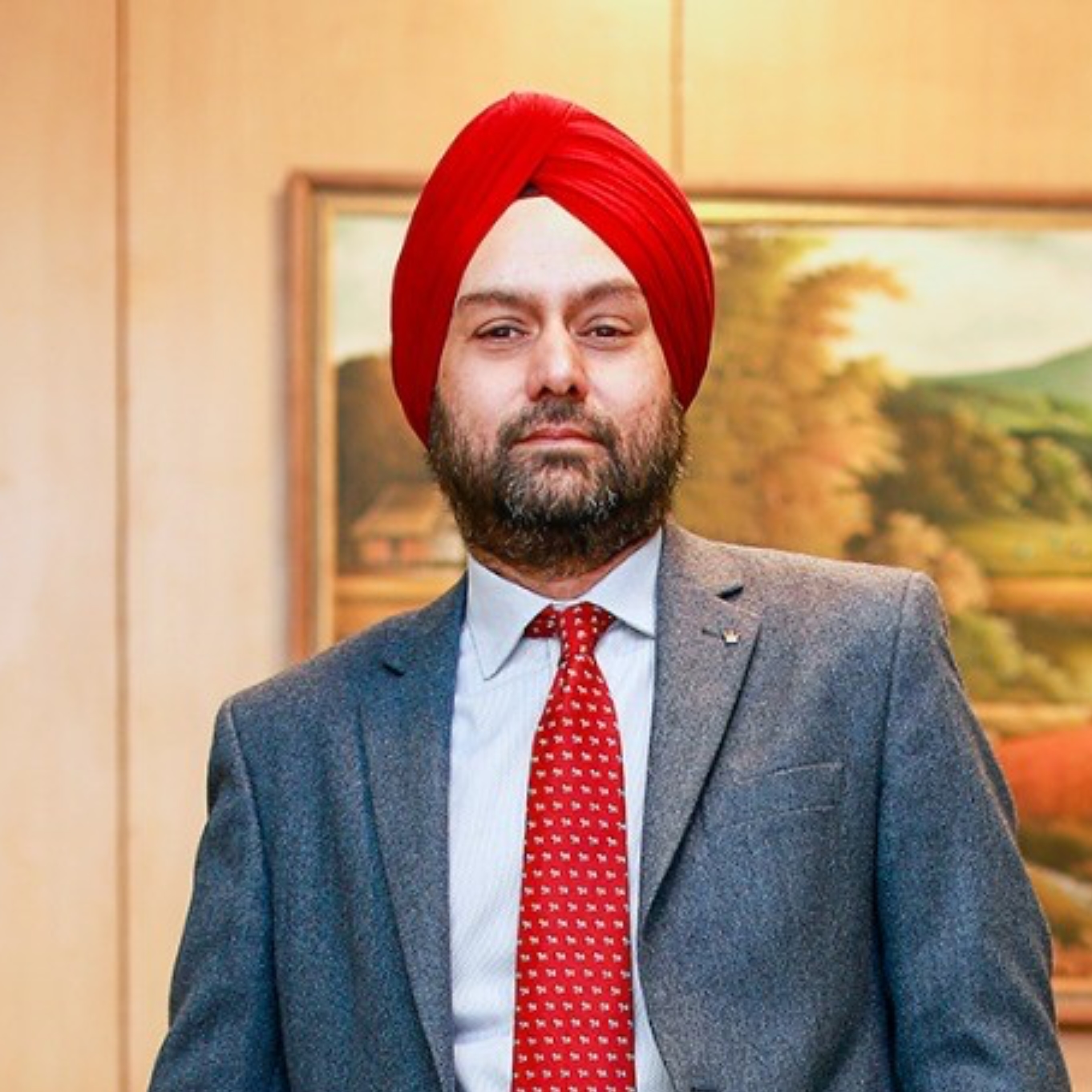
Business Head
Dabur (Nepal and Myanmar)
Mr. Harkirat Singh Bedi, Business Head – Dabur (Nepal & Myanmar) is a seasoned professional in the FMCG industry having worked across product categories & geographies.
With over 24 years of experience & 21 years alone with the Dabur Group he has worked extensively in India, South Asia & SE Asia.
Mr Bedi is an Executive Director in Dabur Nepal & has held Director level positions across group companies / subsidiaries of Dabur .
He has served as an Executive Committee Member in Nepal India Chamber of Commerce and Industries & is currently serving as Vice President of NICCI and Convenor of the India Business Forum.
He is also a National Council Member of CNI and is a part of several important subcommittees of CNI.
Mr Bedi has been twice awarded as “Commercially Important Person” by the Ministry of Commerce & Supplies ,GoN for his contribution to exports.
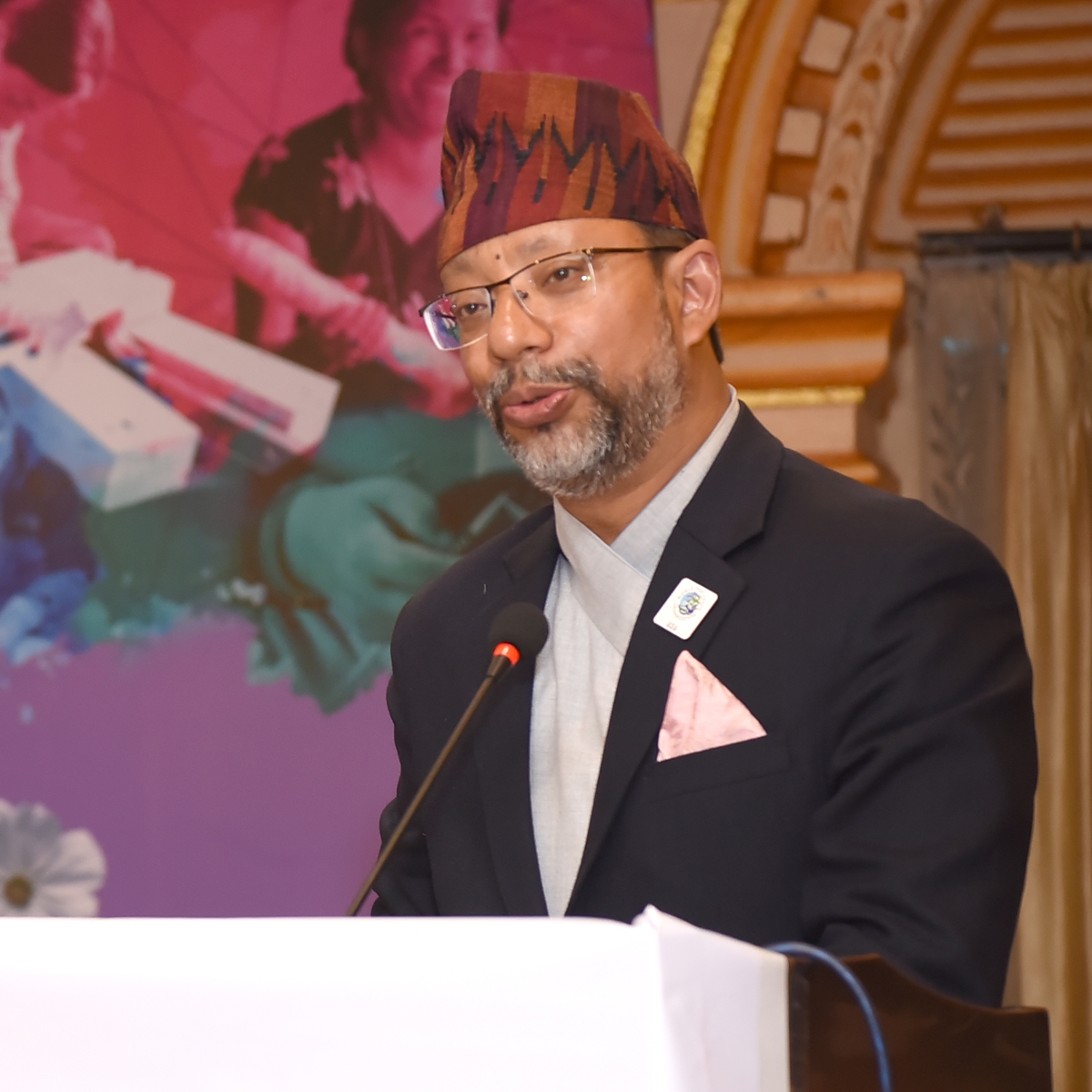
Chairperson,
Fair Trade Group Nepal
Sunil Chitrakar, PhD, is a highly accomplished professional with over two decades of experience in promoting micro and small enterprises and Fair Trade. He holds a PhD in Management from Tribhuvan University, specializing in marketing and entrepreneurship. His areas of expertise includes MSMEs promotion, enterprise development, private sector promotion, policy research, business and marketing.
Sunil is revered for his leadership role as the Chairperson of the Fair Trade Group Nepal, a national consortium dedicated to promoting fair trade practices in the country. Furthermore, he is recognized globally as the Asia Representative and Board Member for the World Fair Trade Organization, based in The Netherlands. Additionally, he sits on the Board of Directors for the World Fair Trade Organization in Asia and is a Member of the Federation of Export Entrepreneurs Nepal.
Currently, Sunil holds several key positions, including MD/CEO of Mahaguthi Craft With Conscience, where he is responsible for promoting and developing the organization’s craft and conscience products. He also serves as a Board Member for Sana Hastakala P. Ltd and Kalpa Craft P. Ltd, contributing his expertise in enterprise development and private sector promotion.
In addition to his professional accomplishments, Sunil has a passion for research and has published numerous research papers in national and international journals. In his leisure time, he enjoys ritual painting and traveling.
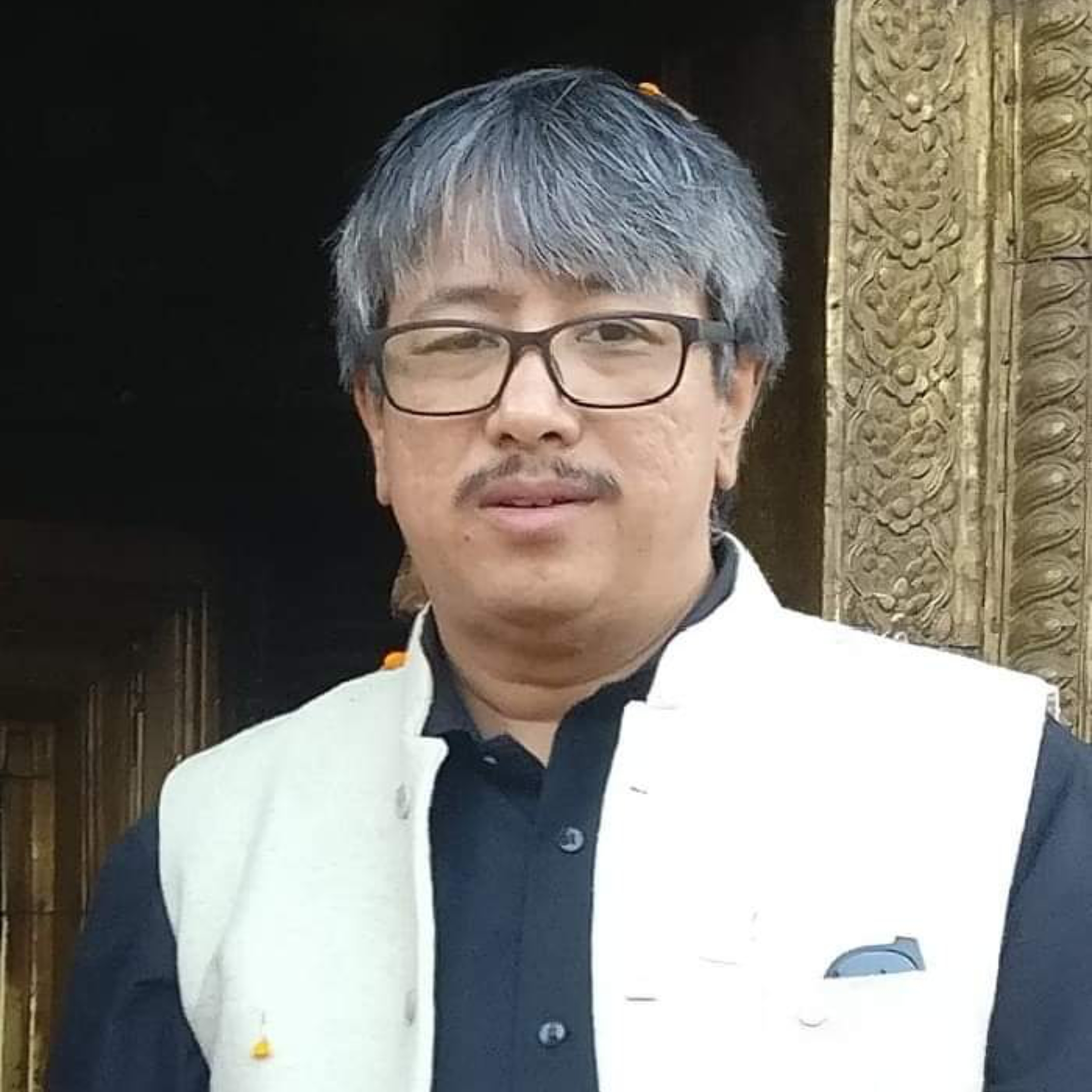
Senior Vice President
Federation of Handicraft Associations of Nepal
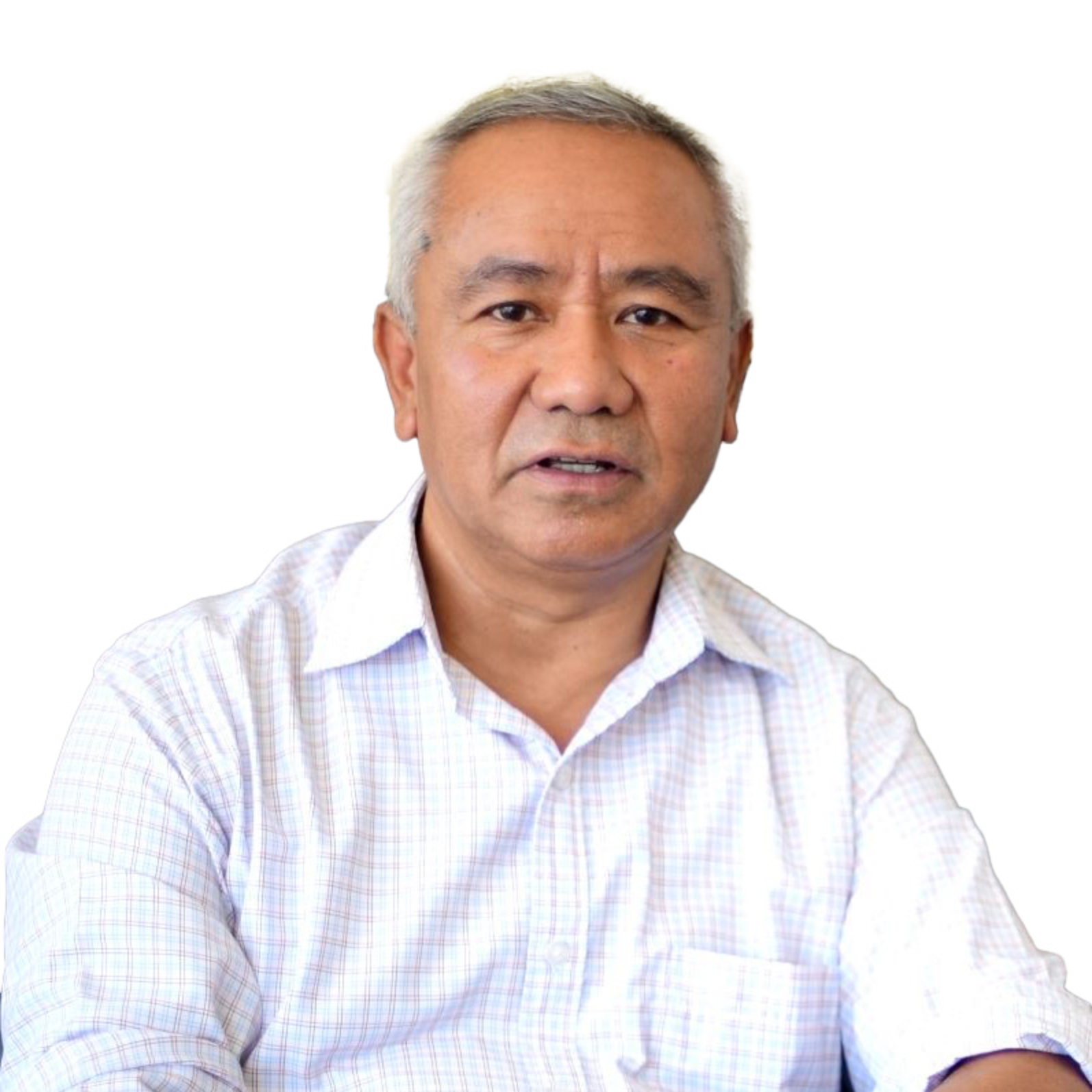
Professor
Kathmandu University
Binod Krishna Shrestha, PhD is a Professor of Marketing and Entrepreneurship with over 22 years of experience at Kathmandu University School of Management (KUSOM). He is also currently serving as an Advisor at Avant Garde Solutions (P) Ltd. With a strong background in brand management, Binod earned his Doctor of Philosophy (PhD) from Kathmandu University in 2011. He also holds a Master’s degree in Development Studies from the University of Bremen and a Master of Business Administration (MBA) from Tribhuvan Vishwavidalaya. Binod has a passion for promoting small enterprise development and has served as a Member of the Board of Directors at the Department of Industry, Government of Nepal for over 11 years.

Deputy Executive Director
National Society for Earthquake Technology-Nepal (NSET)
Dr. Ramesh Guragain, working as a Deputy Executive Director at National Society for Earthquake Technology-Nepal (NSET) has PhD on Earthquake Engineering from The University of Tokyo. Development of Earthquake Risk Assessment System for Nepal is his PhD research. He joined NSET in 1999 and working in the field of earthquake risk management since then. The countries of working experience are mainly in Nepal, India, Pakistan, Bangladesh, Bhutan, Iran, Agfhanistan and shortly in other countries in South/south-east Asia. Public-private partnership on earthquake risk management, business continuity planning, earthquake risk assessment and retrofitting of buildings and infrastructures as well as risk assessment of urban/rural settlements in Nepal and the south Asian region is one of the major program areas that Ramesh is leading from NSET in the past 20 years. Seismic vulnerability assessment of public school buildings in Kathmandu Valley; 20 major hospitals in Nepal; more than 100 office and private residences in Nepal; water supply system of Kathmandu valley; selected public and private buildings in Bhutan; development of fragility functions for non-engineered buildings in Bangladesh; earthquake risk assessment of five different cities in Nepal; three cities in Pakistan, and nine cities in Bangladesh are some of the major activities related to this area that NSET implemented in his leadership. He has also lead a team of professionals at NSET for development of several training curricula and provided trainings to different target audiences. Dr Guragain worked as a chief of party in Baliyo Ghar program on socio-technical support for housing reconstruction program after Gorkha Earthquake. Dr. Guragain has published more than 30 scientific papers related to disaster risk assessment, and risk reduction in international journals and conferences. Currently, he is working as the Capacity Strengthening Lead in Tomorrow’s Cities.

Manager of Business and Government Engagement
Walk Free
Catherine Parsons is Walk Free’s Manager of Business and Government Engagement, and leads Walk Free’s work as secretariat for the Bali Process Government and Business Forum. She is passionate about the role businesses can play in upholding human rights, as well as the need for a strong regulatory response from governments and the international human rights architecture. Catherine previously worked for the Australian Department of Foreign Affairs and Trade and was posted to New Delhi and Jakarta. She holds a Master of International Law and a BA in Journalism.
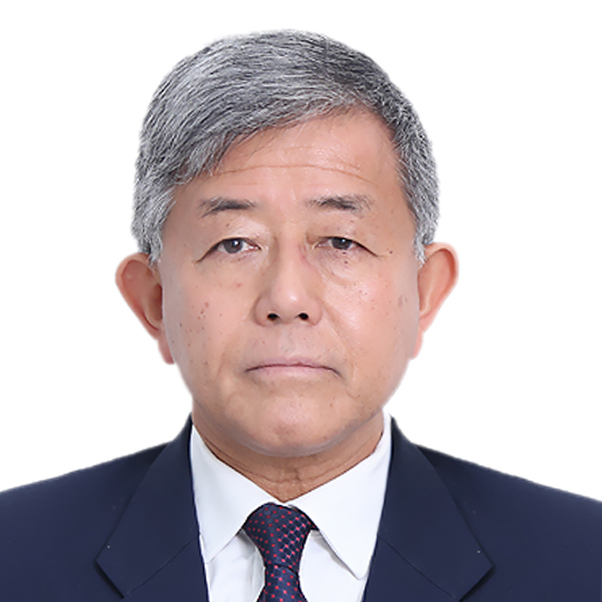
Senior Specialist on Occupational Safety and Health (OSH) and Labour Inspection (LI)
International Labour Organization
Mr. Tsuyoshi Kawakami recently took up the position of Senior Specialist on Occupational Safety and Health (OSH) and Labour Inspection (LI) in the ILO Decent Work Technical Support Team (DWT) in New Delhi. He provides technical advisory services to strengthen national OSH policies and programmes and promote participatory action-oriented training for improving OSH in small enterprises and informal economy workplaces in seven countries in the sub-region: Afghanistan, Bangladesh, India, Maldives, Nepal, Pakistan and Sri Lanka.
Before joining the ILO DWT/New Delhi, he worked in the ILO Head Quarters in Geneva as Senior Specialist in Occupational Safety and Health from 2011 to 2017, promoted ILO OSH standards and assisted member States in developing and implementing strategic national OSH programmes.
Prior to working in Geneva, Tsuyoshi was in the ILO DWT/Bangkok from 2000 to 2011, working on the strengthening of national OSH systems in East and Southeast Asian and Pacific countries. In particular, he was engaged in promoting OSH of small enterprises and informal economy workplaces, developed easy-to-use OSH training materials for workers and employers and trained many local OSH trainers in various workplaces.
Before joining the ILO, he worked in the Institute for Science of Labour, Kawasaki, Japan, as Senior Researcher and carried out many field studies to improve OSH of manufacturing, construction, agriculture and service industries in Japan and other Asian countries. He is a medical doctor, and he has PhD in Public Health from Tokyo Medical and Dental University, Japan.
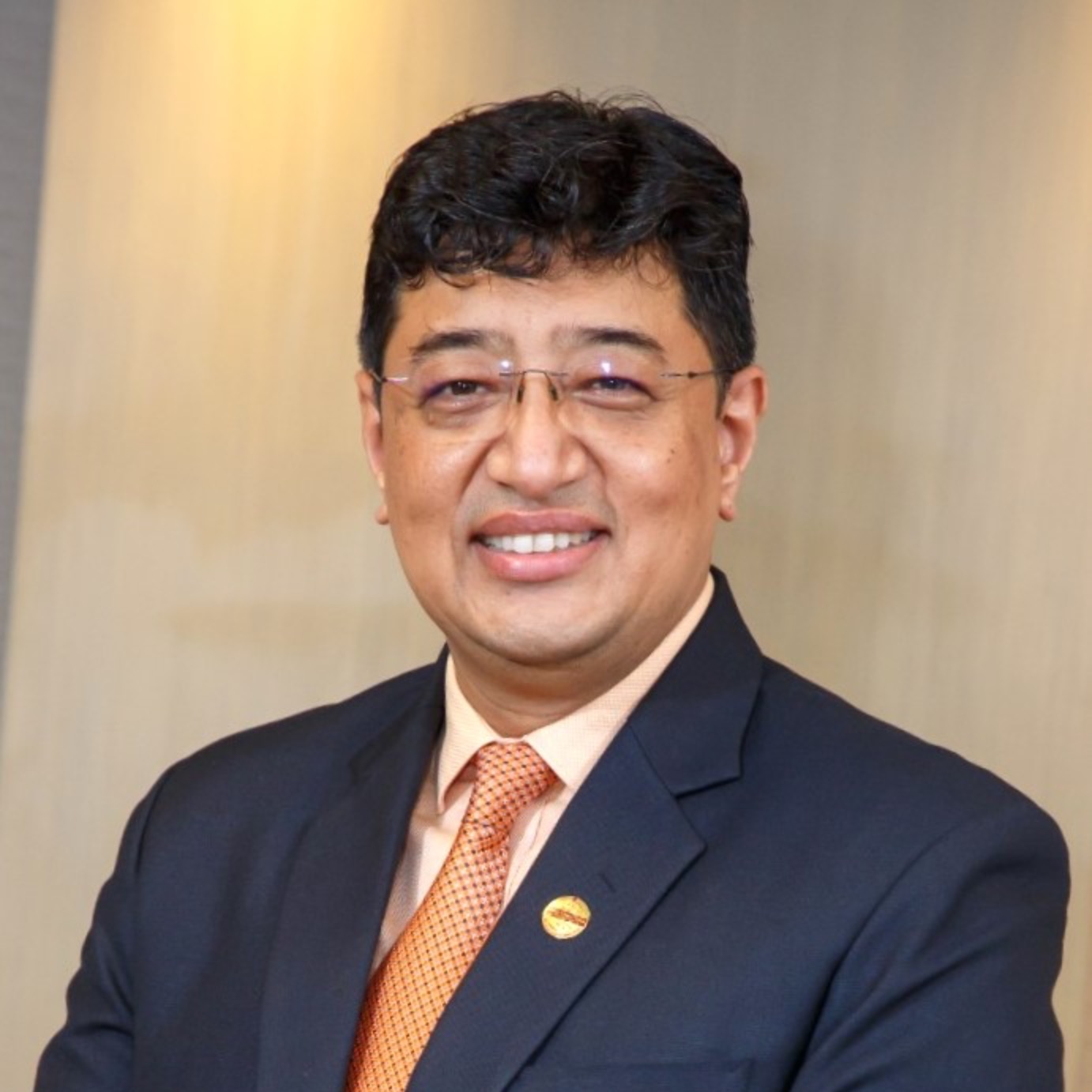
Founder
Tangent Waves
Suman Shakya is an entrepreneur, consultant, and certified trainer. Since 1995, he has been involved in multiple entrepreneurial ventures and as an adjunct faculty of marketing and strategy.
He is the founder of Tangent Waves, an action learning consulting, facilitation, and training company. He is the co-founder of Nepal Entrepreneurs’ Hub; Founder and Board member, of the Nepal Marketing Association of Nepal; and District 41 Director, of Toastmasters International (2023-24). As a consultant, he has worked with the World Bank and is currently Advisor – Private Sector Engagement, USAID’s Tayar Nepal

Managing Director
Dolma Fund Management
Bidhya is Managing Director of Dolma Fund Management which manages Dolma Impact Fund I, first international insititional private equity Fund , dedicated to development of private sector through investment of risk capital in Nepal and Dolma Impact Fund II. The key investors of the funds are FMO, OeeB, Finnfund, DGGF, Swedefund, IFC, BII (formely CDC), DFC and JICA. Prior to Dolma, Bidhya was in banking, he was an instrumental member of the management team which upgraded a financial instution to a commercial Bank.
He has also completed an accelerated development program on Leadership from London Business School. Bidhya was an elected member of the council of Institute of Charted Accountants of Nepal, the apex body in regulation of accounting profession established by the Government of Nepal. Bidhya was a board member in Rastriya Banijya Bank, the largest Bank in Nepal which is owned by the Government of Nepal which is owned by the Government of Nepal. He also serves in board of various companies as a non-executive director representing Dolma Impact Fund.
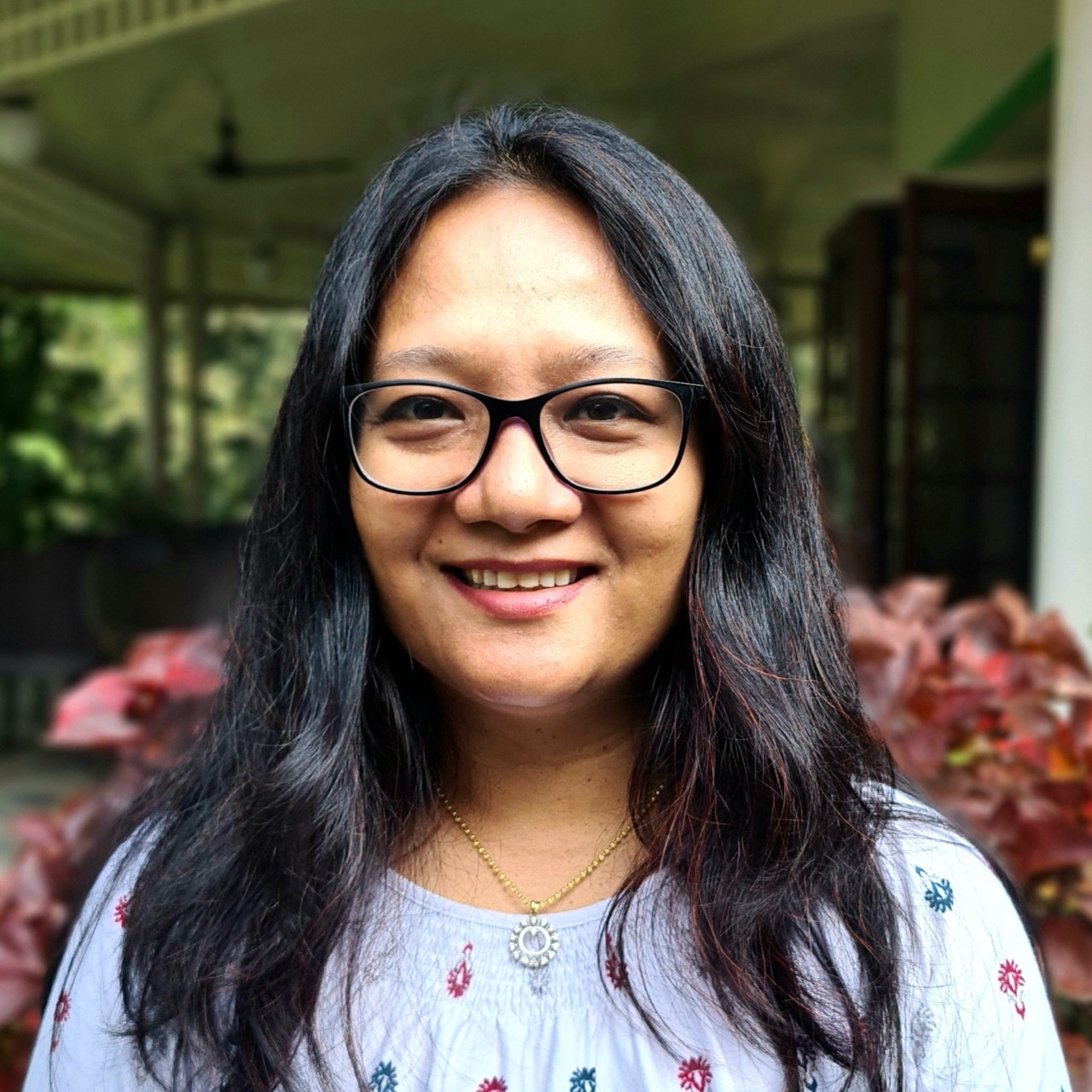
Energy Adviser
British Embassy, Kathmandu
Resha Piya is Energy Adviser at the British Embassy Kathmandu. She oversees the UK aid work in the energy sector in Nepal.
Ms. Piya has more than 20 years of extensive experience in planning, designing, implementation, providing technical leadership, facilitating investment, and evaluating renewable and rural energy projects. She previously worked for the Alternative Energy Promotion Centre and its programmes, Winrock International, Practical Action and Helvetas. She also worked for ADB as an energy access consultant to support the Government of Nepal to achieve universal energy access.
Piya is an Electrical and Electronic Engineer with a MSC in Renewable Energy Engineering and MEng in Energy and Environmental Management. She has received numerous awards, including the Bidhya Bhushan (Awarded by the President of Nepal), DAAD scholarship and Nuffic Scholarship.

CEO
Hotel Mount Princess
She is the founder and CEO of Mount Princess Hotel, Dhulikhel. She has completed her computer engineering degree from Kathmandu University.
She is Secretary of regional Hotel Association, Kavre. She is also the President of Women Entrepreneurs Association, Kavre. She has also been the member of SAARC Chamber Women Entreprenure Council . She is President Elect Rotary Club of Dhulikhel. She is EICC Member and CTEVET School Management Committee Member.

Moderator
SOCIETY: Occupational Safety and Health
Sanam Sakshya
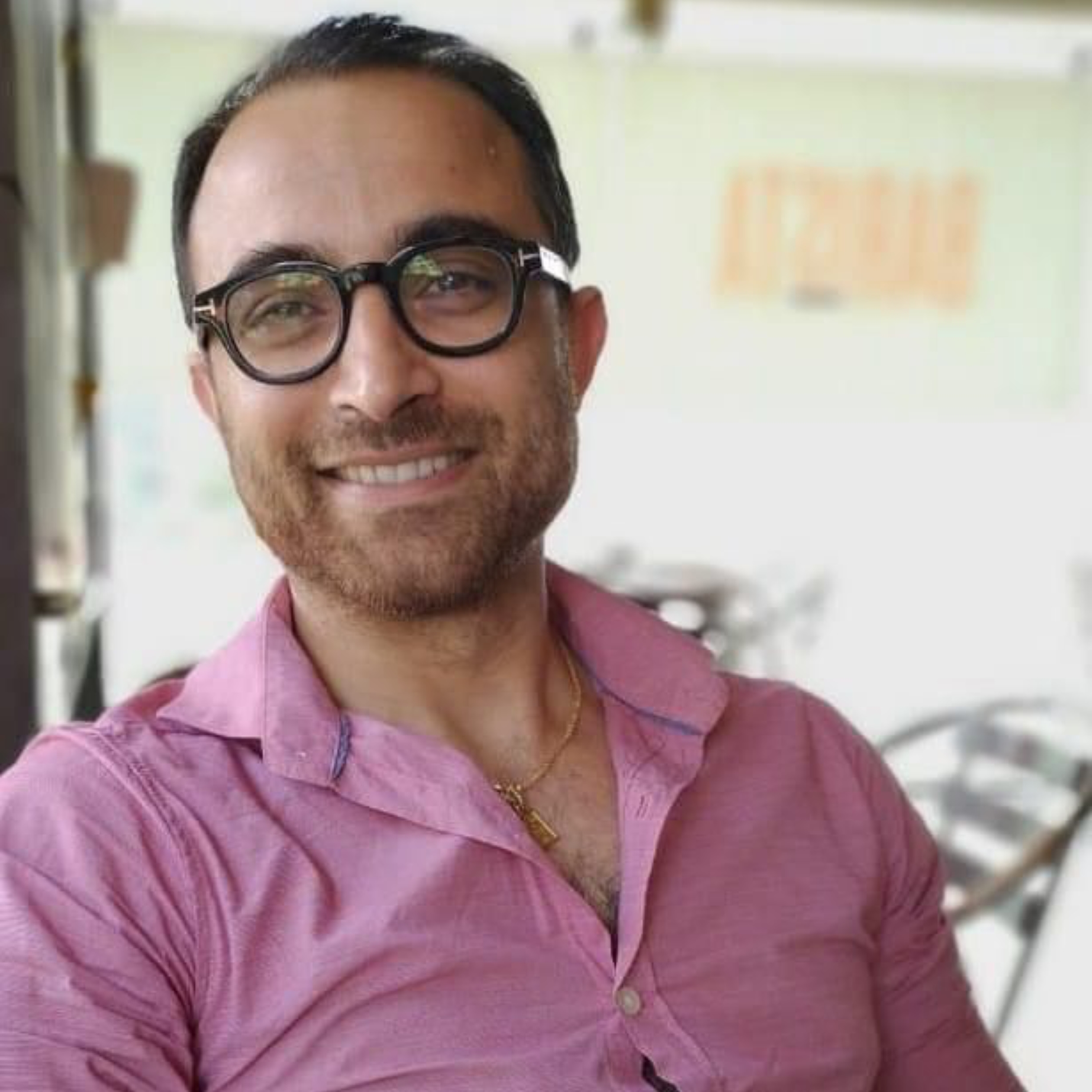
Co-founder / CEO
Tootle

Chairman and CEO
Business Oxygen Pvt. Ltd.
Siddhant has been a banker for over two decades, having worked with Merrill Lynch and Riggs Bank in London. He was also CEO of Ace Development Bank, Nepal. Presently, he operates in the world of Private Equity as the Chairman and CEO of Business Oxygen Pvt. Ltd., the first International SME Venture and Climate Impact Fund in Nepal promoted by the IFC of the World Bank Group, FCDO, Climate Investment Funds (PPCR) and WLC Ventures.
He is Chairman of the Agribusiness Incubation Centre (NABIC), under the Ministry of Agriculture and also Chairs the Nepal Private Equity Association (NPEA). He is a member of the board of directors of Standard Chartered Bank. He was a member of the board of directors of the Investment Promotion Board at the Ministry of Industry and also represented the private sector as a board member of the Investment Committee, Central Renewal Energy Fund, Ministry of Environment and Energy. He served as the Chairman of the Credit Information Bureau of Nepal.
He has a BA degree from Virginia Tech (USA) and MSc. from University of Bristol (UK). He has attended Executive Programs in Global Finance at the London School of Economics.
Sector: Transformer Manufacturing Company
Ownership: Privately held
RBAN Status: Active
Participant Since: November, 2018, April, 2019
Participated Activities: Responsible Business Alliance Nepal (RBAN) Co-creation and Launch, Orientation on RBAN Terms of Reference (ToR), National Co-Creation Workshop to Design and Disseminate CTIP Awareness Communication Campaign, Capacity Building Training of Trainers on Responsible Business Toolkit (RBT)